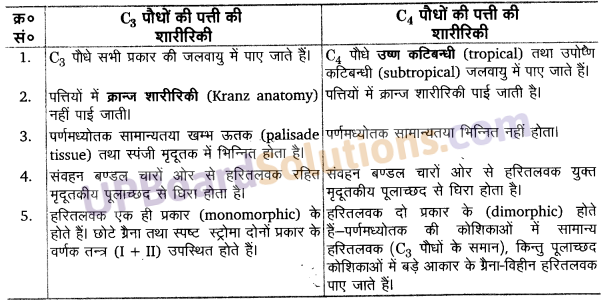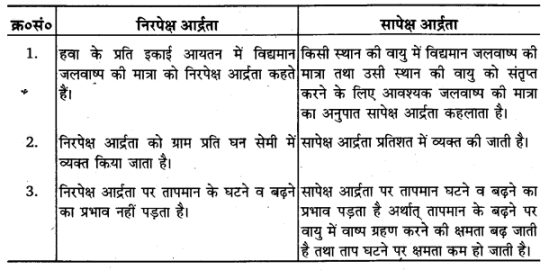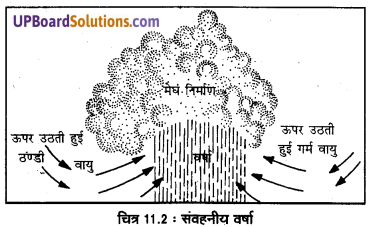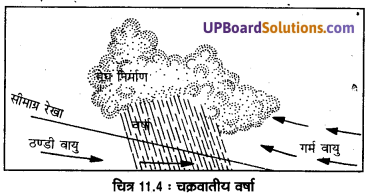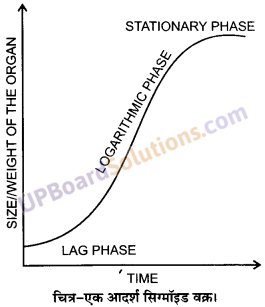UP Board Solutions for Class 11 Chemistry Chapter 13 Hydrocarbons (हाइड्रोकार्बन)
These Solutions are part of UP Board Solutions for Class 11 Chemistry. Here we have given UP Board Solutions for Class 11 Chemistry Chapter 13 Hydrocarbons (हाइड्रोकार्बन).
पाठ के अन्तर्गत दिए गए प्रश्नोत्तर
प्रश्न 1.
मेथेन के क्लोरीनीकरण के दौरान एथेन कैसे बनती है? आप इसे कैसे समझाएँगे?
उत्तर
मेथेन का क्लोरीनीकरण एक मुक्त मूलक अभिक्रिया है जो निम्नलिखित क्रियाविधि से होती है-

प्रश्न 2.
निम्नलिखित यौगिकों के I.U.P.A.C. नाम लिखिए-

उत्तर

प्रश्न 3.
निम्नलिखित यौगिकों, जिनमें द्विआबन्ध तथा त्रिआबन्ध की संख्या दर्शाई गई है, के सभी सम्भावित स्थिति समावयवियों के संरचना सूत्र एवं I.U.P.A.C. नाम दीजिए-
(क) C4H8 (एक द्विआबन्ध)
(ख) C5H8 (एक त्रिआबन्ध)
उत्तर


प्रश्न 4.
निम्नलिखित यौगिकों के ओजोनी-अपघटन के पश्चात् बनने वाले उत्पादों के नाम लिखिए-
(i) पेन्ट-2-ईन
(ii) 3, 4-डाइमेथिल-हेप्ट-3-ईन
(iii) 2-एथिल ब्यूट-1-ईन
(iv) 1-फेनिल ब्यूट-1-ईन
उत्तर

प्रश्न 5.
एक ऐल्कीन ‘A’ के ओजोनी अपघटन से पेन्टेन-3-ओन तथा एथेनॉल का मिश्रण प्राप्त होता है। ‘A’ का I.U.P.A.C. नाम तथा संरचना दीजिए।
उत्तर
ऐल्कीन ‘A’ 3-एथिल पेन्ट-2-ईन है। यह ओजोनी अपघटन पर एथेनले तथा पेन्टेन-3-ओन देता है। इनकी संरचनाएँ निम्नलिखित है-

प्रश्न 6.
एक ऐल्केन A में तीन C—C, आठ C—H सिग्मा-आबन्ध तथा एक C—C पाई आबन्ध हैं। A ओजोनी अपघटन से दो अणु ऐल्डिहाइड, जिनका मोलर द्रव्यमान 44 है, देता है। A का आई०यू०पी०ए०सी० नाम लिखिए।
उत्तर
44 u मोलर द्रव्यमान का ऐल्डिहाइड एथेनल (CH3CHO) है। एथेनल के दो मोलों को एक साथ लिखकर उनके ऑक्सीजन परमाणु हटाते हैं और उन्हें द्विआबन्ध द्वारा जोड़ देते हैं।
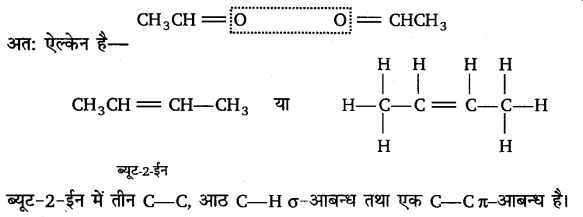
प्रश्न 7.
एक ऐल्कीन, जिसके ओजोनी अपघटन से प्रोपेनॉल तथा पेन्टेन-3-ओन प्राप्त होते हैं, का संरचनात्मक सूत्र क्या है?
उत्तर
उत्पाद हैं-

प्रश्न 8.
निम्नलिखित हाइड्रोकार्बनों के दहन की रासायनिक अभिक्रिया लिखिए-
(i) ब्यूटेन,
(ii) पेन्टीन,
(iii) हेक्साइन,
(iv) टॉलूईन।
उत्तर
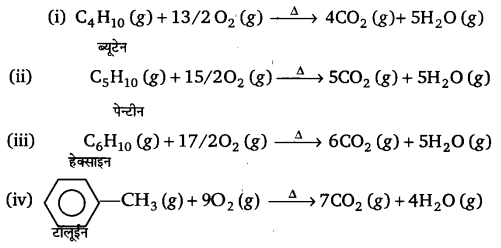
प्रश्न 9.
हेक्स-2-ईन की समपक्ष (सिस) तथा विपक्ष (ट्रांस) संरचनाएँ बनाइए। इनमें से कौन-से समावयव का क्वथनांक उच्च होता है और क्यों?
उत्तर

किसी अणु का क्वथनांक द्विध्रुव-द्विध्रुव अन्योन्यक्रियाओं पर निर्भर करता है। चूंकि सिस समावयवी में उच्च द्विध्रुव आघूर्ण होता है, अतः इसका क्वथनांक उच्च होता है।
प्रश्न 10.
बेन्जीन में तीन द्वि-आबन्ध होते हैं, फिर भी यह अत्यधिक स्थायी है, क्यों?
उत्तर
बेंजीन का अति स्थायित्व अनुनाद या 7-इलेक्ट्रॉनों के विस्थानीकरण के कारण होता है। बेंजीन में सभी 67t-इलेक्ट्रॉन (तीन द्विआबन्धों के) विस्थानीकृत (delocalised) होते हैं तथा अणु को स्थायित्व प्रदान करते हैं।

प्रश्न 11.
किसी निकाय द्वारा ऐरोमैटिकता प्रदर्शित करने के लिए आवश्यक शर्ते क्या हैं?
उत्तर
किसी अणु के ऐरोमैटिक होने के लिए आवश्यक शर्ते निम्न हैं-
- अणु में तल के ऊपर तथा नीचे विस्थानीकृत -इलेक्ट्रॉनों का एक चक्रीय अभ्र (cyclic cloud) होना चाहिए।
- अणु समतलीय होना चाहिए। ये इसलिए आवश्यक है क्योंकि 7-इलेक्ट्रॉनों के पूर्ण विस्थानीकरण के लिए वलय समतलीय होनी चाहिए जिससे p-कक्षकों का चक्रीय अतिव्यापन हो सके।
- इसमें (4n+2) π-इलेक्ट्रॉनं होने चाहिए, जहाँ n = 0, 1, 2, 3, … है। इसे हकल नियम कहते हैं।
प्रश्न 12.
इनमें से कौन-से निकाय ऐरोमैटिक नहीं हैं? कारण स्पष्ट कीजिए-

उत्तर

में एक sp3 संकरित कार्बन परमाणु है, अतः अणु समतलीय नहीं होगा। अणु में 6π-इलेक्ट्रॉन हैं। लेकिन निकाय पूर्णत: संयुग्मित नहीं है चूँकि सभी π-इलेक्ट्रॉन चक्रीय वलय के सभी परमाणुओं के चारों ओर चक्रीय इलेक्ट्रॉन अभ्र नहीं बनाते हैं, अतः यह ऐरोमैटिक यौगिक नहीं है।

ऐरोमैटिक यौगिक नहीं है क्योंकि इसमें एक sp3 कार्बन परमाणु हैं जिसके कारण अणु समतलीय नहीं है। पुनः इसमें केवल 4-इलेक्ट्रॉन हैं अत: निकाय ऐरोमैटिक नहीं है क्योकि (4n +2) π-इलेक्ट्रॉनों युक्त । समतलीय चक्रीय अभ्र उपस्थित नहीं है।

ऐरोमैटिक नहीं है क्योंकि यह 8-इलेक्ट्रॉनों युक्त निकाय है अतः यह हकल के नियम अर्थात् (4n +2) π-इलेक्ट्रॉन का पालन नहीं करता है। साथ ही यह समतलीय न होकर टब आकृति (tub-shaped) का होता है।
प्रश्न 13.
बेन्जीन को निम्नलिखित में कैसे परिवर्तित करेंगे-
(i) p-नाइट्रोब्रोमोबेन्जीन
(ii) m-नाइट्रोक्लोरोबेन्जीन
(iii) p-नाइट्रोटॉलूईन
(iv) ऐसीटोफीनोन।
उत्तर

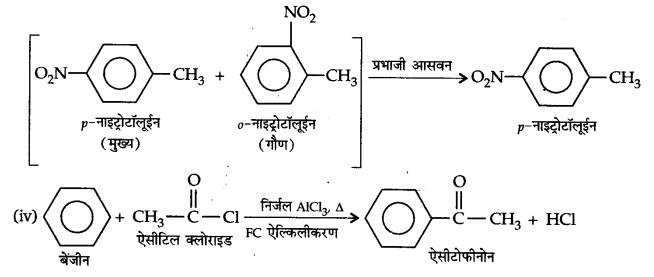
प्रश्न 14.
ऐल्केन HC-CH2-C-(CH32-CH2-CH(CH3) में 1°, 2° तथा 3° कार्बन परमाणुओं की पहचान कीजिए तथा प्रत्येक कार्बन से आबन्धित कुल हाइड्रोजन परमाणुओं की संख्या भी बताइए।
उत्तर

पाँच 1° कार्बन परमाणुओं से 15 H संलग्न हैं।
दो 2° कार्बन परमाणुओं से 4 H संलग्न हैं।
एक 3° कार्बन परमाणु से 1 H संलग्न है।
प्रश्न 15.
क्वथनांक पर ऐल्केन की श्रृंखला के शाखन का क्या प्रभाव पड़ता है?
उत्तर
ऐल्केनों के क्वथनांक शाखन के साथ घटते हैं क्योंकि शाखन (branching) बढ़ने पर ऐल्केन का पृष्ठ क्षेत्रफल गोले (sphere) के समान हो जाता है। चूंकि गोले का पृष्ठ क्षेत्रफल न्यूनतम होता है, अतः वाण्डर वाल्स बल न्यूनतम होते हैं। अतः शाखन पर क्वथनांक घटते हैं।
प्रश्न 16.
प्रोपीन पर HBr के संकलन से 2-ब्रोमोप्रोपेन बनता है, जबकि बेंजॉयल परॉक्साइड की उपस्थिति में यह अभिक्रिया 1-ब्रोमोप्रोपेन देती है। क्रियाविधि की सहायता से इसका
कारण स्पष्ट कीजिए।
उत्तर
प्रोपीन पर HBr का योग आयनिक इलेक्ट्रॉनस्नेही योगात्मक अभिक्रिया है जो मारकोनीकॉफ नियमानुसार होती है। इस अभिक्रिया में सर्वप्रथम Hजुड़कर 2° कार्बोधनायन देता है। इस कार्योधनायन पर नाभिकस्नेही Br- आयन को शीघ्रता से आक्रमण होता है तथा 2-ब्रोमोप्रोपेन प्राप्त होती है।
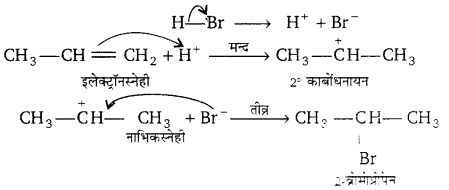
बेन्जॉयल परॉक्साइड की उपस्थिति में अभिक्रिया मुक्त मूलक क्रियाविधि के अनुसार होती है। इस अभिक्रिया में Br मुक्त मुलक इलेक्ट्रॉनस्नेहीं के रूप में कार्य करता है जो बेन्जॉयल परॉक्साइड की HBr से क्रिया द्वारा प्राप्त होता है।

मुक्त मूलक प्रोपीन पर इस प्रकार क्रिया करता है कि अधिक स्थायी द्वितीयक (2°) मुक्त मूलक की उत्पत्ति हो सके। यह 2° मूलक HBr से एक H-परमाणु ग्रहण कर 1-ब्रोमोप्रोपेन देता है।

प्रश्न 17.
1, 2-डाइमेथिलबेन्जीन (o-जाइलीन) के ओजोनी अपघटन के फलस्वरूप निर्मित उत्पादों को लिखिए। यह परिणाम बेन्जीन की केकुले संरचना की पुष्टि किस प्रकार
करता है?
उत्तर
0-जाइलीन को निम्नलिखित दो केकुले संरचनाओं को अनुनाद संकर माना जाता है। प्रत्येक के ओजोनी अपघटन से दो उत्पाद प्राप्त होते हैं-

अतः समग्र रूप से तीन उत्पाद निर्मित होते हैं। चूंकि सभी तीन उत्पाद दो केकुले संरचनाओं में से एक से प्राप्त नहीं हो सकते हैं इससे प्रदर्शित होता है कि o-जाइलीन दो केकुले संरचनाओं का अनुनाद संकर है।
प्रश्न 18.
बेन्जीन, n-हैक्सेन तथा एथाइन को घटते हुए अम्लीय व्यवहार के क्रम में व्यवस्थित कीजिए और इस व्यवहार का कारण बताइए।
उत्तर
इन तीनों यौगिकों में कार्बन की संकरण अवस्था निम्नवत् है-

कक्षक का 5-लक्षण बढ़ने पर अम्लीय लक्षण बढ़ता है अतः अम्लीय लक्षण निम्न क्रम में घटता है-
ऐसीटिलीन > बेंजीन > हेक्सेन
प्रश्न 19.
बेन्जीन इलेक्ट्रॉनस्नेही प्रतिस्थापन अभिक्रियाएँ सरलतापूर्वक क्यों प्रदर्शित करती हैं, जबकि उसमें नाभिकस्नेही प्रतिस्थापन कठिन होता है?
उत्तर
C6H6 (बेंजीन) की कक्षक संरचना प्रदर्शित करती है कि -इलेक्ट्रॉन अभ्र वलय के ऊपर तथा नीचे स्थित है तथा ढीला व्यवस्थित है अत: इलेक्ट्रॉनस्नेही के लिए आसानी से उपलब्ध है, अत: बेंजीन इलेक्ट्रॉनस्नेही प्रतिस्थापन अभिक्रियाएँ शीघ्रता से देती है तथा नाभिकस्नेही प्रतिस्थापन क्रियाएँ: कठिनता से देती है।
प्रश्न 20.
आप निम्नलिखित यौगिकों को बेन्जीन में कैसे परिवर्तित करेंगे?
(i) एथाइन
(ii) एथीन
(iii) हेक्सेन।
उत्तर

प्रश्न 21.
उन सभी ऐल्कीनों की संरचनाएँ लिखिए, जो हाइड्रोजनीकरण करने पर 2-मेथिल । ब्यूटेन देती हैं।
उत्तर
उत्पाद की संरचना निम्नवत् है-

प्रश्न 22.
निम्नलिखित यौगिकों को उनकी इलेक्ट्रॉनस्नेही (E) के प्रति घटती आपेक्षिक क्रियाशीलता के क्रम में व्यवस्थित कीजिए-
(क) क्लोरोबेन्जीन, 2, 4-डाइनाइट्रोक्लोरोबेन्जीन, p-नाइट्रोक्लोरोबेन्जीन
(ख) टॉलूईन, p-H3C-C6H4-NO2,p-O2N-C6H4-NO2
उत्तर
(क) क्लोरोबेंजीन > p-नाइट्रोक्लोरोबेंजीन > 2,4-डाइनाइट्रोक्लोरोबेंजीन,
(ख) टॉलूईन > p-H3C-C6H4-NO2> p-O2N-C6H4-NO2
प्रश्न 23.
बेन्जीन, m-डाइनाइट्रोबेन्जीन तथा टॉलूईन में से किसका नाइट्रीकरण आसानी से होता है और क्यों?
उत्तर
CH3 समूह इलेक्ट्रॉनदाता समूह होता है जबकि -NO2 समूह इलेक्ट्रॉन निष्कासक होता है। अतः अधिकतम इलेक्ट्रॉन घनत्व टॉलूईन में होगा उससे कम बेंजीन में तथा सबसे कम m-डाइनाइट्रोबेंजीन में। अतः नाइट्रीकरण का घटता हुआ क्रम निम्न होगा-
टॉलूईन > बेंजीन > m-डाइनाइट्रोबेंजीन
प्रश्न 24.
बेन्जीन के एथिलीकरण में निर्जल ऐलुमिनियम क्लोराइड के स्थान पर कोई दूसरा लूइस अम्ल सुझाइए।
उत्तर
निर्जल FeCl3, SnCl4, BF3 आदि।
प्रश्न 25.
क्या कारण है कि वुज अभिक्रिया विषम संख्याकार्बन परमाणु वाले विशुद्ध ऐल्केन बनाने के लिए प्रयुक्त नहीं की जाती? एक उदाहरण देकर स्पष्ट कीजिए।
उत्तर
विषम संख्या कार्बन परमाणु युक्त ऐल्केनों के बनाने में दो ऐल्किल हैलाइडों का प्रयोग किया जाता है। ये दो ऐल्किल हैलाइड तीन भिन्न प्रकारों से अभिकृत होकर वांछित ऐल्केन के स्थान पर तीन ऐल्केनों का मिश्रण बनाते हैं। 1-ब्रोमोप्रोपेन तथा 1-ब्रोमोब्यूटेन की वुटुंज अभिक्रिया से हेक्सेन, हेप्टेन तथा ऑक्टेन का मिश्रण प्राप्त होता है जैसा कि नीचे प्रदर्शित है-
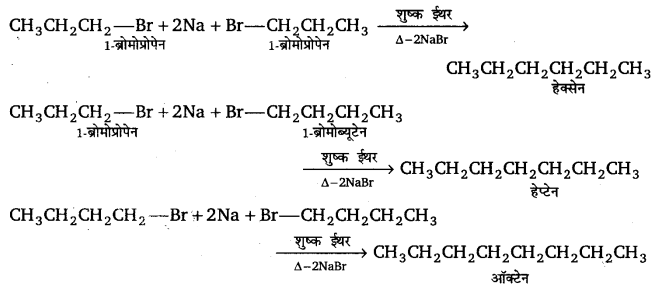
परीक्षोपयोगी प्रश्नोत्तर
बहुविकल्पीय प्रश्न
प्रश्न 1.
निम्नलिखित में कौन-सा ऐरोमैटिक यौगिक नहीं है?
(i) बेंजीन
(ii) ऐनिलीन
(iii) साइक्लोहेक्सेन
(iv) पिरीडीन
उत्तर
(iii) साइक्लोहेक्सेन
प्रश्न 2.
निम्नलिखित ब्यूटेनॉल के सम्भव समावयवियों में प्रकाशिक समावयवता प्रदर्शित करने वाला यौगिक है।
(i) CH3CHOHCH2—CH3
(ii) CH3-CH2 CH2-CH2-OH
(iii) (CH3)2CHCH2-OH
(iv) (CH3)3COH
उत्तर
(i) CH3CHOHCH2-CH3
प्रश्न 3.
प्रयोगशाला में बॉयर अभिकर्मक का प्रयोग किया जाता है।
(i) द्विबन्ध की जाँच के लिए
(ii) ग्लूकोस की जाँच के लिए
(iii) अपचयन के लिए
(iv) ऑक्सीकरण के लिए
उत्तर
(i) द्विबन्ध की जाँच के लिए
प्रश्न 4.
ऐसीटिलीन अणु में हैं।
(i) 5 δ बन्ध
(ii) 4 δ तथा 1 π बन्ध
(iii) 3 δ तथा 2 π बन्ध
(iv) 2 δ तथा 3 π बन्ध
उत्तर
(iii) 3 δ तथा 2 π बन्ध
प्रश्न 5.
C5H10 आणविक सूत्र वाले निम्न में से किस यौगिक के ओजोनी अपघटन से ऐसीटोन प्राप्त होती है?
(i) 3-मेथिल-ब्यूट-1-ईन
(ii) साइक्लोपेन्टेन
(iii) 2-मेथिल-ब्यूट-1-ईन
(iv) 2-मेथिल-ब्यूट-2-ईन
उत्तर
(iv) 2-मेथिल-ब्यूट-2-ईन
प्रश्न 6.
प्रोपाइन तथा प्रोपीन पहचाने जा सकते हैं।
(i) सांद्र H2SO4 द्वारा।
(ii) CCl4 में Br2 के द्वारा।
(iii) तनु KMnO4 द्वारा
(iv) अमोनियाकृत AgNO3 द्वारा
उत्तर
(iv) अमोनियाकृत AgNO3 द्वारा
प्रश्न 7.
निम्न में से कौन-सा यौगिक द्विध्रुव आघूर्ण प्रदर्शित करता है?
(i) 1,4- डाइक्लोरोबेंजीन
(ii) 1, 2-डाइक्लोरोबेंजीन
(iii) ट्रान्स-1,2-डाइक्लोरोएथेन
(iv) ट्रान्स-ब्यूट-2-ईन
उत्तर
(i) 1, 2-डाइक्लोरोबेंजीन
प्रश्न 8.
रक्त-तप्त नलियों में C2H2 को गर्म करने पर कौन-सा यौगिक बनता है।
(i) एथिलीन
(ii) बेंजीन
(iii) एथेन
(iv) मेथेन
उत्तर
(ii) बेंजीन
प्रश्न 9.
निम्न में से बेंजीन के सल्फोनीकरण में कौन भाग लेता है?
(i) SO2
(ii) SO3H+
(iii) SO3
(iv) SO3H–
उत्तर
(ii) SO3
प्रश्न 10.
बेंजीन पर सूर्य के प्रकाश में क्लोरीन की अभिक्रिया से बनता है।
(i) पिक्रिक अम्ल
(ii) क्लोरोपिक्रिन
(iii) नाइट्रोमेथेन
(iv) गैमेक्सीन
उत्तर
(iv) गैमेक्सीन
अतिलघु उत्तरीय प्रश्न
प्रश्न 1.
ऐलिफैटिक संतृप्त हाइड्रोकार्बन या ऐल्केन से आप क्या समझते हैं?
या
ऐल्केनों को पैराफिन क्यों कहते हैं?
उत्तर
ऐलिफैटिक संतृप्त हाइड्रोकार्बन वे यौगिक होते हैं जिनमें उपस्थित परमाणुओं की सभी श्रृंखलाएँ खुली हुई होती हैं, प्रत्येक कार्बन परमाणु की चारों संयोजकताएँ एकल आबन्धों द्वारा सन्तुष्ट होती हैं तथा केवल कार्बन और हाइड्रोजन उपस्थित होते हैं। इने यौगिकों को ऐल्केन भी कहते हैं। चूंकि ये यौगिक (ऐल्केन) अन्य कार्बनिक यौगिकों की तुलना में कम क्रियाशील होते हैं; इसलिए इन्हें पैराफिन कहते हैं।
प्रश्न 2.
ऐल्केनों की संरचना को स्पष्ट कीजिए।
उत्तर
ऐल्केनों में प्रत्येक कार्बन परमाणु sp3 संकरित होता है अत: प्रत्येक कार्बन परमाणु की संरचना समचतुष्फलकीय होती है। दूसरे शब्दों में, प्रत्येक कार्बन परमाणु एक समचतुष्फलक के केन्द्र पर स्थित होता है तथा उसकी संयोजकताएँ समचतुष्फलक के शीर्षों की ओर दिष्ट होती हैं। किन्हीं भी दो संयोजकताओं के मध्य 109°28′ का कोण होता है।
ऐल्केनों में C—C आबन्ध लम्बाई 1.54 तथा C—H आबन्ध लम्बाई 1.09Å होती है।
प्रश्न 3.
निम्नलिखित यौगिकों का संरचनात्मक सूत्र लिखिए
(i) 3, 4, 4, 5-टेट्रामेथिलहेप्टेन
(ii) 2, 5-डाइमेथिलहेक्सेन
उत्तर
(i) CH3–CH2–CH(CH3)=C(CH3)2-CH(CH3)–CH2–CH3
(ii) CH2—CH(CH3)–CH2–CH2–CH(CH3)2CH3
प्रश्न 4.
वुटुंज अभिक्रिया द्वारा आप प्रोपेन किस प्रकार बनाएँगे?
उत्तर
एथिल आयोडाइड और मेथिल आयोडाइड की सोडियम से अभिक्रिया ईथर की उपस्थिति में कराने पर प्रोपेन एवं अन्य हाइड्रोकार्बनों का मिश्रण प्राप्त होता है।

प्रश्न 5.
प्रोपेन के विरचन के लिए किस अम्ल के सोडियम लवण की आवश्यकता होगी? अभिक्रिया का रासायनिक समीकरण लिखिए।
उत्तर
प्रोपेन के विरचन के लिए ब्यूटेनोइक अम्ल के सोडियम लवण की आवश्यकता होती है।
![]()
प्रश्न 6.
ऐल्केन के शाखित होने से उसकी गलनांक किस प्रकार प्रभावित होगा?
उत्तर
ऐल्केन के शाखित होने से उसके अणु क्रिस्टल जालक में दूर-दूर हो जाते हैं। इससे गलनांक घट जाता है। यदि शाखित होने पर अणु सममित हो जाता है तो अणु क्रिस्टल जालक में निविड संकुलित हो जाते हैं जिससे गलनांक में वृद्धि हो जाती है।
प्रश्न 7.
ऐल्केनों की दहन अभिक्रिया को समझाइए।
उत्तर
ऐल्केनें ऑक्सीजन या वायु की अधिकता में ज्योतिहीन ज्वाला के साथ जलकर कार्बन डाइऑक्साइड और जल बनाती हैं। अभिक्रिया में ऊष्मा (heat) और प्रकाश (light) निकलते हैं।
CH4 + 2O2 → CO2 +2H2O+212.8Kcal
C2H6 + 3[latex]\frac { 1 }{ 2 } [/latex]O2 → 2CO2 + 3H2O+373.0 Kcal
मेथेन और वायु (आधिक्य) के मिश्रण को प्रज्वलित करने पर विस्फोट होता है तथा कार्बन डाइऑक्साइड और जल बनते हैं। कोयले की खानों में विस्फोट होने का यही कारण है।
प्रश्न 8.
ऐल्केनों के ताप अपघटन को समझाइए।
उत्तर
वायु की अनुपस्थिति में उच्च ताप पर गर्म करने से कार्बनिक यौगिक का तापीय अपघटन (thermal decomposition) उनका ताप अपघटन (pyrolysis) कहलाता है।
उदाहरणार्थ-

उच्च ऐल्केनें वायु की अनुपस्थिति में, उच्च ताप (500-600°C) पर गर्म करने पर छोटे अणुओं में अपघटित हो जाती है। उच्च अणु भार को ऐल्केनों का लघु अणु भार के हाइड्रोकार्बनों में ताप अपघटन भंजन (cracking) कहलाता है। किसी ऐल्केन के भंजन से प्राप्त उत्पाद ऐल्केन की संरचना दाब, ताप, उत्प्रेरक की उपस्थिति आदि कारकों पर निर्भर करते हैं।
प्रश्न 9.
ऐल्केनों के भंजन में C—H आबंधों के स्थान पर C—C आबंध क्यों टूटते हैं।
उत्तर
C—C आबंधों की आबंध वियोजन ऊर्जा C—H आबंधों की आबंध वियोजन ऊर्जा की तुलना में कम होती है। इसलिए ऐल्केनों के भंजन के दौरान C—Cआबंध C—H आबंधों की तुलना में आसानी से टूटते हैं।
प्रश्न 10.
सामान्य ताप पर एथेन के शुद्ध संरूपणों को पृथक करना संभव क्यों नहीं है?
उत्तर
एथेन के दो चरम रूपों (ग्रसित तथा सांतरित संरूपणों) के मध्य ऊर्जा का अंतर 12.5 kJ mol-1 होता है जो कि बहुत कम है। सामान्य ताप पर अंतराण्विक संघट्टों के द्वारा एथेन अणु में तापीय तथा गतिज ऊर्जा होती है जो 12.5kJ mol-1 के ऊर्जा अवरोध को पार करने में सक्षम होती है। इसलिए सामान्य ताप पर एथेन के शुद्ध ग्रसित तथा शुद्ध सांतरित संरूपणों को पृथक् करना संभव नहीं है।
प्रश्न 11.
ऐल्कीन क्या हैं तथा इन्हें ओलीफिन क्यों कहते हैं?
उत्तर
वे ऐलिफैटिक असंतृप्त हाइड्रोकार्बन जिनमें केवल एक कार्बन-कार्बन द्वि-आबन्ध उपस्थित होता है, ऐल्कीन कहलाते हैं। ऐल्कीन श्रेणी का प्रथम सदस्य एथिलीन है जो क्लोरीन के साथ अभिक्रिया करके तेल जैसा पदार्थ एथिलीन डाइक्लोराइड बनाता है। इसीलिए इस श्रेणी के सदस्यों को ओलीफिन (तेल बनाने वाला) कहते हैं।
प्रश्न 12.
निम्नलिखित यौगिकों के IUPAC नाम लिखिए

उत्तर
- 2,8-डाइमेथिल डेका-3,6-डाइईन
- ऑक्टा -1,3,5,7-टेट्राईन
- 2-प्रोपिलपेन्ट-1-ईन
- 4-एथिल-2,6-डाइमेथिलडेके-4-ईन
प्रश्न 13.
ऐल्कीनों में संरचनात्मक समावयवता को उदाहरण देकर समझाइए।
उत्तर
ऐल्कीन श्रेणी के प्रथम दो सदस्य (एथीन तथा प्रोपीन) समावयवता प्रदर्शित नहीं करते हैं। इस श्रेणी के अन्य सदस्य स्थिति समावयवता तथा श्रृंखला समावयवता प्रदर्शित करते हैं।
उदाहरणार्थ-अणुसूत्र C4H8 तीन समावयवी ऐल्कीनों को प्रदर्शित करता है।

यहाँ संरचनाएँ I और II स्थिति समावयवियों को और संरचनाएँ I और II तथा II और II श्रृंखला समावयवियों को प्रदर्शित करती हैं।
प्रश्न 14.
निम्नलिखित यौगिकों के समपक्ष (cis) तथा विपक्ष (trans) समावयवी बनाइए और उनके IUPAC नाम लिखिए
(i) CHCl = CHCl
(ii) C2H5C(CH3)=C(CH3)C2H5
उत्तर

प्रश्न 15.
किस धातु का कार्बाइड जल से क्रिया करके ऐसीटिलीन गैस उत्पन्न करता है? रासायनिक समीकरण दीजिए।
उत्तर

प्रश्न 16.
ऐल्कीनों के सामान्य भौतिक गुणों का वर्णन कीजिए।
उत्तर
ऐल्कीनों के प्रमुख सामान्य भौतिक गुण निम्नवत् हैं
- इस श्रेणी के प्रथम तीन सदस्य एथीन, प्रोपीन तथा ब्यूटीन रंगहीन गैसें हैं। इसके बाद के | C16H32 तक के सदस्य द्रव तथा इससे ऊँचे सदस्य ठोस होते हैं।
- ये जल में अविलेय होते हैं परन्तु ऐल्कोहॉल, बेंजीन तथा ईथर जैसे कार्बनिक विलायकों में विलेय होते हैं।
- अणु भार के बढ़ने के साथ इनके आपेक्षिक घनत्व, गलनांक तथा क्वथनांक बढ़ते जाते हैं।
- सभी ऐल्कीन वायु में प्रकाश-युक्त लौ के साथ जलती हैं।
प्रश्न 17.
एथेन की तुलना में एथिलीन अधिक क्रियाशील है। क्यों?
उत्तर
एथिलीन में 1 π बन्धं उपस्थित है इसलिए एथिलीन, एथेन की तुलना में अधिक क्रियाशील है।
प्रश्न 18.
HCI, HBr, HI तथा HF को उनकीं ऐल्कीनों से क्रियाशीलता के घटते क्रम में व्यवस्थित कीजिए।
उत्तर
HI > HBr > HCl> HF
प्रश्न 19.
एथेन और एथीन में कैसे विभेद करेंगे?
उत्तर
एथेन और एथीन में विभेद परीक्षण

प्रश्न 20.
ऐल्काइन क्या हैं?
उत्तर
वे ऐलिफैटिक असंतृप्त हाइड्रोकार्बन जिनमें केवल एक कार्बन-कार्बन द्वि-आबन्ध उपस्थित होता है, ऐल्काइन कहलाते हैं। इनमें उपस्थित त्रि-आबन्धों को ऐसीटिलीनिक आबन्ध भी कहते हैं।
प्रश्न 21.
ऐल्काइनों के प्रमुख भौतिक गुणधर्म लिखिए।
उत्तर
ऐल्काइनों के प्रमुख भौतिक गुणधर्म निम्नवत् हैं-
- ऐल्काइन श्रेणी के प्रथम तीन सदस्य (C2 से C4) गैसें, अगले आठ सदस्य (C52 से C12) द्रव तथा शेष उच्च सदस्य ठोस हैं।
- ऐल्काइने रंगहीन तथा स्वादहीन होती हैं।
- ऐल्काइने जल में लगभग अविलेय और कार्बनिक विलायकों में विलेय होती हैं।
- ऐल्काइनों के गलनांक, क्वथनांक और आपेक्षिक घनत्व उनके अणुभार बढ़ने के साथ-साथ बढ़ते हैं।
प्रश्न 22.
एथीन और एथाइन में विभेद करने के लिए प्रयुक्त किए जाने वाले दो अभिकर्मकों के नाम लिखिए।
उत्तर
अमोनियामय सिल्वर नाइट्रेट विलयन और अमोनियामय क्यूप्रस क्लोराइड विलयन।
प्रश्न 23.
ऐरोमैटिक हाइड्रोकार्बन अथवा ऐरीन क्या हैं? उदाहरण सहित समझाइए।
उत्तर
वे हाइड्रोकार्बन तथा उनके ऐल्किल, ऐल्किनिल एवं एल्काइनिल व्युत्पन्न जिनमें एक अथवा अधिक बेंजीन वलय होती हैं, ऐरोमैटिक हाइड्रोकार्बन अथवा ऐरीन कहलाते हैं। उदाहरणार्थ-बेंजीन, टॉलूईन, नैफ्थेलीन, बाइफेनिल आदि।
प्रश्न 24.
निम्न के IUPAC नाम लिखिए

उत्तर
- 2-हाइड्रॉक्सी 3-फेनिल ब्यूटेनल,
- एथिल एथेनोएटप्रश्न
प्रश्न 25.
प्रोपाइन, ब्यूट डाइईन, बेंजीन में से किसमें सर्वाधिक आबंध हैं?
उत्तर
बेंजीन में (3)।
प्रश्न 26.
बेंजीन अति असंतृप्त होती है परन्तु फिर भी यह योगात्मक अभिक्रियाएँ प्रदर्शित नहीं करती है। क्यों?
उत्तर
ऐसा इलेक्ट्रॉनों के विस्थानीकरण (delocalization) के कारण अतिरिक्त स्थायित्व के कारण होता है।
प्रश्न 27.
मेसीटिलीन के ओजोनी अपघटन के उद क्या होंगे?
उत्तर

प्रश्न 28.
फ्रीडल-क्राफ्ट्स अभिक्रिया का एक उदाहरण दीजिए।
उत्तर

लघु उत्तरीय प्रश्न
प्रश्न 1.
ऐल्केनों में पायी जाने वाली समावयवता का वर्णन कीजिए।
उत्तर
ऐल्केन श्रेणी के प्रथम तीन सदस्य अर्थात् मेथेन, एथेन तथा प्रोपेन समावयवता प्रदर्शित नहीं करते हैं। इस श्रेणी के अन्य सभी सदस्य श्रृंखला समावयवता प्रदर्शित करते हैं।
उदाहरणार्थ-अणु सूत्र C2H10, C5H12, तथा C6H14 द्वारा प्रदर्शित समावयवियों की संरचनाएँ तथा उनके नाम निम्नवत् हैं।


स्पष्ट है कि अणु सूत्र C4H10, C5H12 तथा C2H14 द्वारा प्रदर्शित समावयवियों की कुल संख्या क्रमशः दो, तीन व पाँच हैं। ऐल्केनों में किसी अन्य प्रकार की संरचनात्मक समावयवता नहीं पायी जाती है।
प्रश्न 2.
एक ऐल्केन (अणुभार = 72) मोनोक्लोरीनीकरण करने पर केवल एक क्रियाफल देती है। ऐल्केन का नाम बताइए।
उत्तर
ऐल्केन का सामान्य सूत्र CnH2n+2 होता है।

प्रश्नानुसार, ऐल्केन का मोनो क्लोरीनीकरण कराने पर केवल एक उत्पाद बनता है; अतः सभी हाइड्रोजन एक जैसे होने चाहिए। इसलिए वह ऐल्केन 2, 2-डाइमेथिल प्रोपेन होगी।
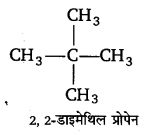
प्रश्न 3.
ऐल्केनों के भौतिक गुणों का संक्षेप में वर्णन कीजिए।
उत्तर
ऐल्केनों के प्रमुख भौतिक गुण निम्नवत् हैं-
- अवस्था-ऋजु श्रृंखला ऐल्केनों के प्रथम चार सदस्य (C1 से C4) रंगहीन, गंधहीन गैसें हैं। अगले उच्च सदस्य (C5 से C17) रंगहीन वाष्पशील द्रव हैं तथा और उच्च सदस्य रंगहीन ठोस हैं|
- विलेयता-ऐल्केन अध्रुवीय प्रकृति की होने के कारण ध्रुवीय विलायकों में अविलेय लेकिन अध्रुवीय कार्बनिक विलायकों में विलेय हैं (समान समान को घोलता है)।
- घनत्व—ऐल्केनों के घनत्व ऐल्केनों के अणुभार बढ़ने के साथ बढ़ते हैं। किसी भी ऐल्केन का घनत्व 0.8 gcm-3 से अधिक नहीं है अर्थात् सभी ऐल्केनें जल से हल्की होती हैं।
- क्वथनांक-सीधी श्रृंखला या n-ऐल्केनों के क्वथनांक कार्बन परमाणुओं की संख्या बढ़ने पर नियमित रूप से बढ़ते हैं। सामान्यतः श्रेणी के दो उत्तरोत्तर सदस्यों (प्रथम कुछ सदस्यों को छोड़कर) के क्वथनांकों में अन्तर 20-30°C होता है। समावयवी ऐल्केनों में साधारण समावयवी का क्वथनांक शाखित श्रृंखला समावयवी से अधिक होता है। श्रृंखला अधिक शाखित होने पर क्वथनांक कम होते हैं।
क्वथनांक में परिवर्तन को अन्तराण्विक आकर्षण बलों के पदों में समझाया जा सकता है। ये बल अणु की सतह के सापेक्ष कार्य करते हैं तथा इनका परिमाण पृष्ठ सतह के क्षेत्रफल के बढ़ने पर बढ़ता है। जैसे ही श्रेणी में आण्विक आकार बढ़ता है वैसे ही पृष्ठ क्षेत्रफल बढ़ता है। तथा क्वथनांक भी बढ़ते हैं।
n-ऐल्केनों में शाखित श्रृंखला समावयवियों की तुलना में अधिक पृष्ठ क्षेत्रफल होता है, अत: अन्तराण्विक बल शाखित श्रृंखला समावयवियों में दुर्बल होते हैं। अतः इनके क्वथनांक सीधी श्रृंखला समावयवियों की तुलना में निम्न होते हैं। - गलनांक-आण्विक आकार के बढ़ने के साथ-साथ ऐल्केनों के गलनांकों में क्रमिक परिवर्तन, नहीं पाया जाता है। सम संख्या में कार्बन परमाणुओं वाले ऐल्केनों के गलनांक विषम संख्या में कार्बन परमाणुओं वाले ऐल्केनों से उच्च होते हैं। सम कार्बन संख्या वाले n-ऐल्केन विषम कार्बन संख्या वाले n-ऐल्केनों की तुलना में अधिक सममित होते हैं अर्थात् वे क्रिस्टल जालक में अधिक निविड़ संकुलित (closely packed) होते हैं। दूसरे शब्दों में, इनमें अन्तराण्विक आकर्षण बल अधिक होते हैं, अत: इनके गलनांक कुछ उच्च होते हैं।

प्रश्न 4.
संरूपण क्या है? एथेन के परिप्रेक्ष्य में वर्णन कीजिए।
उत्तर
संरूपण-ऐसे परमाणुओं की त्रिविम व्यवस्थाएँ जो C—C एकल आबन्ध के घूर्णन के कारण एक-दूसरे में परिवर्तित हो जाती हैं, संरूपण, संरूपणीय समावयव या घूर्णी कहलाती हैं।

एथेन के सॉहार्स प्रक्षेप एथेन के संरूपण-एथेन के असंख्य संरूपण होते हैं। इनमें से दो संरूपण चरम होते हैं। एक रूप में दोनों कार्बन के हाइड्रोजन परमाणु एक-दूसरे के अधिक पास हो जाते हैं उसे ग्रस्त रूप कहते हैं। दूसरे रूप में, हाइड्रोजन परमाणु दूसरे कार्बन के हाइड्रोजन परमाणुओं से अधिकतम दूरी पर रहते हैं। उन्हें सांतरित रूप कहते हैं। इनके अलावा कोई भी मध्यवर्ती संरूपण विषमतलीय संरूपण कहलाता है। सभी संरूपणों में आबन्ध कोण तथा आबन्ध लम्बाई समान रहती है। ग्रस्त तथा सांतरित संरूपणों को सॉहार्स तथा न्यूमैन प्रक्षेप द्वारा प्रदर्शित किया जाता है।
- सॉहार्स प्रक्षेप–इस प्रक्षेपण में अणु को आण्विक अक्ष की दिशा में देखा जाता है। कागज पर केंद्रीय C-C आबंध को दिखाने के लिए दाईं या बाईं ओर झुकी हुई एक सीधी रेखा खींची जाती है। इस रेखा को कुछ लंबा बनाया जाता है। आगे वाले कार्बन को नीचे बाईं ओर तथा पीछे वाले कार्बन को ऊपर दाईं ओर से प्रदर्शित करते हैं। प्रत्येक कार्बन से संलग्न तीन हाइड्रोजन परमाणुओं को तीन रेखाएँ। खींचकर दिखाया जाता है। ये रेखाएँ एक-दूसरे से 120° का कोण बनाकर झुकी होती हैं।
- न्यूमैन प्रक्षेप–इस प्रक्षेपण में अणु को सामने से देखा जाता है। आँख के पास वाले कार्बन को एक बिंदु द्वारा दिखाया जाता है और उससे जुड़े तीन हाइड्रोजन परमाणुओं को 120° कोण पर खींची तीन रेखाओं के सिरों पर लिखकर प्रदर्शित किया जाता है। पीछे (आँख से दूर) वाले कार्बन को एक वृत्त द्वारा दर्शाते हैं तथा इसमें आबंधित हाइड्रोजन परमाणुओं को वृत्त की परिधि से परस्पर 120° के कोण पर स्थित तीन छोटी रेखाओं से जुड़े हुए दिखाया जाता है।
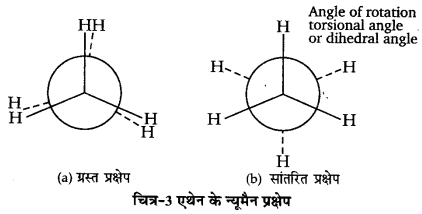
प्रश्न 5.
ऐल्कीनों में पाये जाने वाले कार्बन-कार्बन द्वि-आबन्ध की संरचना समझाइए।
या
द्विआबन्धं पर संक्षिप्त टिप्पणी लिखिए।
उत्तर
ऐल्कीनों में C=C द्विआबंध होता है, जिसमें एक प्रबल सिग्मा (σ) आबंध (आबंध एंथैल्पी लगभग 348 kJmol-1 है) होता है, जो दो कार्बन परमाणुओं के spसंकरित कक्षकों के सम्मुख अतिव्यापन से बनता है। इसमें दो कार्बन परमाणुओं के 2p2 असंकरित कक्षकों के पार्श्व अतिव्यापन करने पर एक दुर्बल पाई (π) आबंध, (आबंध एंथैल्पी 251 kJmol-1 है) बनता है।
C—C एकल आबंध लंबाई (154 pm) की तुलना में C=C द्विआबंध लंबाई (134 pm) छोटी होती है। पाई (π) आबंध दो p-कक्षकों के दुर्बल अतिव्यापन के कारण दुर्बल होते हैं। अतः पाई (π) आबंध वाले ऐल्कीनों को दुर्बल बंधित गतिशील इलेक्ट्रॉनों का स्रोत कहा जाता है। अत: ऐल्कीनों पर उन अभिकर्मकों अथवा यौगिकों, जो इलेक्ट्रॉनों की खोज में होते हैं, का आक्रमण आसानी से हो जाता है। एथीन अणु के कक्षीय आरेख चित्र निम्नवत् हैं।

प्रश्न 6.
निम्नलिखित यौगिकों के IUPAC नाम लिखिए-


उत्तर
- 3, 3-डाइमेथिल-1-हेक्सिन,
- 2-एथिल ब्यूटानॉइल क्लोराइड।
प्रश्न 7.
निम्नलिखित यौगिकों के IUPAC नाम लिखिए-

उत्तर
- 2-एथिल ब्यूटानल,
- 2-एथिल 3-मेथिल ब्यूटीन।
प्रश्न 8.
ऐल्कीनों में ज्यामितीय समावयवता को समझाइए।
या
ऐल्कीन ज्यामितीय समावयवता क्यों प्रदर्शित करती हैं?
उत्तर
द्विआबंधित कार्बन परमाणुओं की बची हुई दो संयोजकताओं को दो परमाणु या समूह जुड़कर संतुष्ट करते हैं। अगर प्रत्येक कार्बन से जुड़े दो परमाणु या समूह भिन्न हैं तो इसे YXC = CXY द्वारा प्रदर्शित करते हैं। ऐसी संरचनाओं को दिक् में निम्न प्रकार प्रदर्शित किया जाता है|

संरचना ‘a’ में एकसमान दो परमाणु (दोनों x या दोनों Y) द्विआबंधित कार्बन परमाणुओं के एक ही ओर स्थित होते हैं। संरचना ‘b’ में दोनों x अथवा दोनों Y द्विआबंधित कार्बन की दूसरी तरफ या द्विआबंधित कार्बन परमाणु के विपरीत स्थित होते हैं, जो विभिन्न ज्यामिति दर्शाते हैं। इनका दिक् में परमाणु या समूहों की भिन्न स्थितियों के कारण विन्यास भिन्न होता है।

अतः ये त्रिविम समावयवी (stereo isomers) हैं। इनकी समान ज्यामिति तब होती है, जब द्विआबंधित कार्बन परमाणुओं या समूहों का घूर्णन हो सकता है, परन्तु C= C द्विआबंध में मुक्त घूर्णन नहीं होता। यह प्रतिबंधित होता है। अत: परमाणुओं अथवा समूहों के द्विआबंधित कार्बन परमाणुओं के मध्य प्रतिबंधित घूर्णन के कारण यौगिकों द्वारा भिन्न ज्यामितियाँ प्रदर्शित की जाती हैं। इस प्रकार के त्रिविम समावयवी, जिसमें दो समान परमाणु या समूह एक ही ओर स्थित हों, उन्हें समपक्ष (cis) कहा जाता है, जबकि दूसरे समावयवी, जिसमें दो समान परमाणु या समूह विपरीत ओर स्थित हों, विपक्ष (trans) समावयवी कहलाते हैं। इसलिए दिक् में समपक्ष तथा विपक्ष समावयवों की संरचना समान होती है, किंतु विन्यास भिन्न होता है। दिक् में परमाणुओं या समूहों की भिन्न व्यवस्थाओं के कारण ये समावयवी अनेक गुणों (जैसे-गलनांक, क्वथनांक, द्विध्रुव आघूर्ण, विलेयता आदि) में भिन्नता दर्शाते हैं। ब्यूट-2-ईन की ज्यामितीय समावयवता अथवा समपक्ष-विपक्ष समावयवता को निम्नलिखित संरचना द्वारा प्रदर्शित किया जाता है-

ऐल्कीन का समपक्ष रूप विपक्ष की तुलना में अधिक ध्रुवीय होता है।
उदाहरणार्थ-समपक्ष ब्यूट-2-ईन का द्विध्रुव आघूर्ण 0.350 डिबाई है, जबकि विपक्ष ब्यूट-2-ईन का लगभग शून्य होता है। अतः विपक्ष ब्यूट-2-ईन अध्रुवीय है। इन दोनों रूपों की निम्नांकित विभिन्न ज्यामितियों को बनाने से यह पाया गया है कि विपक्ष-ब्यूट-2-ईन के दोनों मेथिल समूह, जो विपरीत दिशाओं में होते हैं, प्रत्येक C-CH, आबंध के कारण ध्रुवणता को नष्ट करके विपक्ष रूप को निम्न प्रकार अध्रुवीय बनाते हैं-
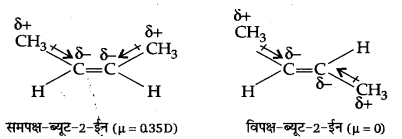
ठोसों में विपक्ष समावयवियों के गलनांक समपक्ष समावयवियों की तुलना में अधिक होते हैं। ज्यामितीय या समपक्ष (cis) विपक्षः (trans) समावयवता, XYC = CXZ तथा XYC = CZW प्रकार की ऐल्कीनों द्वारा भी प्रदर्शित की जाती है।
प्रश्न 9.
ऐल्कीन मुख्यतः इलेक्ट्रॉनस्नेही अभिकर्मकों से अभिक्रिया करती हैं न कि नाभिकस्नेही अभिकर्मकों से। क्यों?
या
ऐल्कीन मुख्यतः इलेक्ट्रॉनस्नेही योगात्मक अभिक्रियाएँ प्रदर्शित करती हैं न कि इलेक्ट्रॉनस्नेही प्रतिस्थापन अभिक्रियाएँ क्यों?
उत्तर
ऐल्कीन में द्विआबंध होता है। इनमें से एक प्रबल कार्बन-कार्बन सिग्मा (π) आबंध और एक दुर्बल पाई (σ) आबंध होता है। π – इलेक्ट्रॉनों का इलेक्ट्रॉन अभ्र σ-आबंधित कार्बन परमाणुओं के तल के ऊपर तथा नीचे स्थित होता है। अतः π-इलेक्ट्रॉन कार्बन परमाणुओं से शिथिलता (loosely) से बद्ध होते हैं। चूंकि इलेक्ट्रॉन ऋणावेशित कण होते हैं इसलिए π-इलेक्ट्रॉन इलेक्ट्रॉनस्नेही को आकर्षित और नाभिकस्नेही को प्रतिकर्षित करते हैं। अतः ऐल्कीन इलेक्ट्रॉनस्नेही अभिक्रियाएँ प्रदर्शित करती हैं।
इलेक्ट्रॉनस्नेही अभिक्रियाएँ दो प्रकार की हो सकती हैं-योगात्मक तथा प्रतिस्थापन।
इलेक्ट्रॉनस्नेही प्रतिस्थापन अभिक्रियाओं में एक σ- कार्बन-हाइड्रोजन आबंध टूटता है और द्विआबंधित कार्बन परमाणुओं तथा इलेक्ट्रॉनस्नेही के मध्य एक नया σ-आबंध बनता है। इलेक्ट्रॉनस्नेही प्रतिस्थापन अभिक्रियाओं में अधिक ऊर्जा परिवर्तन नहीं होता है क्योंकि σ-कार्बन-हाइड्रोजन आबंध तथा नए σ – C – X आबंध की आबंध ऊर्जाओं में अधिक अंतर नहीं होता है।
इलेक्ट्रॉनस्नेही योगात्मक अभिक्रियाओं में एक दुर्बल -आबंध टूटता है और दो प्रबल o-आबंधों का निर्माण होता है। इस अभिक्रिया में 445 kJmol-1 (2 x 348 kJmol-1 – 251 kJmol-1) ऊर्जा मुक्त होती है। स्पष्ट है कि ऊर्जा की दृष्टि से इलेक्ट्रॉनस्नेही योगात्मक अभिक्रियाएँ इलेक्ट्रॉनस्नेही प्रतिस्थापन अभिक्रियाओं से अधिक अनुकूल होती हैं। यही कारण है कि ऐल्कीन मुख्यतः इलेक्ट्रॉनस्नेही योगात्मक अभिक्रियाएँ प्रदर्शित करती हैं न कि इलेक्ट्रॉनस्नेही प्रतिस्थापन अभिक्रियाएँ।
प्रश्न 10.
इलेक्ट्रॉनस्नेही योगात्मक अभिक्रियाओं की क्रियाविधि समझाइए।
या
एथिलीन के Br2 से योग की क्रियाविधि समझाइए।
उत्तर
इलेक्ट्रॉनस्नेही योगात्मक अभिक्रियाओं की क्रियाविधि को एथिलीन के Br2 से योग के उदाहरण द्वारा समझा जा सकता है। यह अभिक्रिया निम्न दो पदों में होती है-
पद 1–ब्रोमीन अणु (अध्रुवीय) जब एथिलीन अणु के पास आता है तो द्विआबंध के E-इलेक्ट्रॉन ब्रोमीन अणु में दोनों ब्रोमीन परमाणुओं को बाँधे रखने वाले इलेक्ट्रॉन युग्म को प्रतिकर्षित करने लगते हैं जिससे ब्रोमीन अणु का ध्रुवण हो जाता है। इस ब्रोमीन द्विध्रुव को धन सिरा इलेक्ट्रॉनस्नेही की भाँति व्यवहार करता है। एथिलीन अणु के 7-इलेक्ट्रॉन इस सिरे को आकर्षित करके -संकर (E-complex) बनाते हैं जो बाद में कार्बोधनायन और ब्रोमाइड आयन देता है।
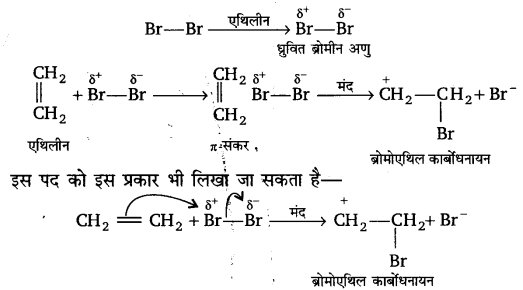
यह पद मंद पद (slow step) है। अतः यह अभिक्रिया का दर निर्धारक पद (rate determining step) है।
पद 2–प्राप्त कार्बोधनायन अत्यंत क्रियाशील होता है। विलयन में उपस्थित ब्रोमाइड आयन इस पर नाभिकस्नेही आक्रमण करके योगोत्पाद (addition product) बनाता है।

प्रश्न 11.
मारकोनीकॉफ नियम तथा परॉक्साइड प्रभाव का वर्णन कीजिए।
उत्तर
मारकोनीकॉफ का नियम-इस नियम के अनुसार-जब कोई असममित ऐल्कीन किसी असममित अणु से योग करती है तो जुड़ने वाले अणु का धनात्मक भाग द्विआबंध बनाने वाले उस कार्बन परमाणु से जुड़ता है जिस पर अधिक हाइड्रोजन परमाणु उपस्थित होते हैं।
उदाहरणार्थ-

इस प्रकार उपरोक्त अभिक्रिया में HBr का धनात्मक भाग अर्थात् H+ कार्बन परमाणु संख्या 1 से संयुक्त होता है क्योंकि कार्बन परमाणु संख्या 1 पर कार्बन परमाणु संख्या 2 की तुलना में अधिक हाइड्रोजन परमाणु उपस्थित हैं।
परॉक्साइड प्रभाव या खैराश प्रभाव-खैराश (Kharasch) तथा उनके सहयोगियों ने सन् 1933 में प्रयोगों द्वारा यह ज्ञात किया कि परॉक्साइड जैसे बेन्जोइल परॉक्साइड की उपस्थिति में असममित ऐल्कीनों पर HBr (HCl अथवा HI का नहीं) का योग मारकोनीकॉफ के नियम के विरुद्ध होता है।
उदाहरणार्थ-
![]()
परॉक्साइड परॉक्साइड की उपस्थिति में ऐल्कीनों के इस अपसामान्य (abnormal) व्यवहार को खैराश प्रभाव (Kharasch effect) या परॉक्साइड प्रभाव (peroxide effect) कहते हैं।
प्रश्न 12.
मेथिल ऐसीटिलीन, अमोनियम क्यूप्रस क्लोराइड के साथ क्रिया करके लाल अवक्षेप देती है जबकि डाइमेथिल ऐसीटिलीन लाल अवक्षेप नहीं देती है। कारण स्पष्ट कीजिए।
उत्तर

मेथिल ऐसीटिलीन में एक अम्लीय हाइड्रोजन परमाणु उपस्थित है इसकी CuCl तथा NH4OH से अभिक्रिया कराने पर क्यूप्रस मेथिल ऐसीटेलाइड का लाल अवक्षेप बनता है। डाइमेथिल ऐसीटिलीन में कोई अम्लीय हाइड्रोजन परमाणु उपस्थित नहीं है, इसलिए यह NH4OH तथा CuCl के साथ लाल अवक्षेप नहीं देता है।
प्रश्न 13.
ऐल्काइनों द्वारा प्रदर्शित की जाने वाली समावयवता का वर्णन कीजिए।
या
ऐल्काइनों में पायी जाने वाली समावयवता पर टिप्पणी लिखिए।
उत्तर
ऐल्काइन निम्नलिखित प्रकार की समावयवता प्रदर्शित करती हैं-
- स्थान समावयवता या स्थिति समावयवता–ऐल्काइन श्रेणी के प्रथम दो सदस्य एथाइन तथा प्रोपाइन केवल एक रूप में पाए जाते हैं। ब्यूटाइन तथा अन्य उच्च ऐल्काइन कार्बन श्रृंखला में त्रिआबंध की विभिन्न स्थितियों के अनुसार स्थिति समावयवती प्रदर्शित करते हैं।
उदाहरणार्थ-

- श्रृंखला समावयवता–पाँच तथा उससे अधिक कार्बन परमाणु वाले ऐल्काइन श्रृंखला समावयवता प्रदर्शित करते हैं। यह समावयवता कार्बन श्रृंखला की विभिन्न संरचनाओं के कारण होती है।
उदाहरणार्थ-

- क्रियात्मक समावयवता-ऐल्काइन दो द्विआबंधों वाले यौगिकों के क्रियात्मक समावयवी होते हैं।
उदाहरणार्थ-

- वलय-श्रृंखला समावयवता-ऐल्काइन साइक्लोऐल्कीनों के साथ वलय-श्रृंखला समावयवता प्रदर्शित करते हैं।
उदाहरणार्थ-

प्रश्न 14.
एथाइन का उदाहरण देते हुए त्रिआबन्ध की संरचना को समझाइए।
या
त्रिआबन्ध की संरचना पर टिप्पणी लिखिए।
उत्तर
एथाइन ऐल्काइन श्रेणी का सरलतम अणु है। इसके प्रत्येक कार्बन परमाणु के दो sp संकरित कक्षकों के समअक्षीय अतिव्यापन से कार्बन-कार्बन सिग्मा आबंध बनता है। प्रत्येक कार्बन परमाणु का शेष sp संकरित कक्षक अन्तरानाभिकीय अक्ष के सापेक्ष हाइड्रोजन परमाणु के 1s कक्षक के साथ अतिव्यापन करके दो C-H सिग्मा आबंध बनाते हैं।

H — C—C आबंध कोण 180° का होता है। प्रत्येक कार्बन परमाणु के पास C—C आबंध तथा तल के लंबवत् असंकरित p-कक्षक होते हैं। एक कार्बन परमाणु को 2p कक्षक दूसरे के समांतर होता है, जो समपाश्विक अतिव्यापन करके दो कार्बन परमाणुओं के मध्य दो (पाई) बंध बनाते हैं। अतः एथाइन अणु में एक C—C(सिग्मा) आबंध, दो C — H (सिग्मा) आबंध तथा दो C—C (पाई) आबंध होते हैं।
C ☰ C की आबंध सामर्थ्य 823 kJmol-1 है, जो C⚌C द्विआबंध आबंध एंथैल्पी 681 kJmol-1C—C एकल आबंध आबंध एंथैल्पी 348 kJmol-1 से अधिक होती है। C ☰ C की त्रिआबंध लम्बाई (120 pm), C=C द्विआबंध (134 pm) तथा C—C एकल आबंध (154 pm) की तुलना में छोटी होती है। अक्षों पर दो कार्बन परमाणुओं के मध्य इलेक्ट्रॉन अभ्र अंतरानाभिकीय सममित बेलनाकार स्थिति में होते हैं। एथाइन एक रेखीय अणु है।
प्रश्न 15.
बेंजीन की संरचना से सम्बन्धित अनुनाद संकल्पना क्या है?
उत्तर
अनुनाद संकल्पना के अनुसार बेंजीन को दोनों केकुले संरचनाओं का अनुनादी संकर माना जाता है।

बेंजीन की वास्तविक संरचना न तो I है और न ही II है लेकिन इन दोनों संरचनाओं का मध्यमान है। इसके समस्त गुणों की व्याख्या संरचना I या II से नहीं की जा सकती है लेकिन संरचना I तथा II के मध्यमान से की जा सकती है। अत: बेंजीन में प्रत्येक कार्बन-कार्बन आबन्ध की लम्बाई एकल आबंध लम्बाई 1.54 Å तथा द्विआबन्ध लम्बाई 1.34Å के मध्य 1.39 Å होती है। अनुनाद का प्रमुख प्रभाव यह होता है कि अनुनाद संकर का स्थायित्व अनुनाद संरचनाओं के स्थायित्व से अधिक होता है। इस प्रकार बेंजीन की अनुनाद संरचना से इसके स्थायित्व की व्याख्या भी हो जाती है।
प्रश्न 16.
बेंजीन की संरचना की आण्विक ऑर्बिटल संकल्पना क्या है? संक्षेप में समझाइए।
उत्तर
आण्विक ऑर्बिटल संकल्पना के अनुसार बेंजीन अणु में छ: कार्बन परमाणु एक चक्रीय श्रृंखला में उपस्थित होते हैं। प्रत्येक कार्बन परमाणु sp2 संकरित होता है। प्रत्येक कार्बन परमाणु में तीन sp2 संकरित ऑर्बिटल तीन सिग्मा आबन्ध बनाने में प्रयुक्त होते हैं। प्रत्येक कार्बन परमाणु एक सिग्मा आबन्ध एक हाइड्रोजन परमाणु से तथा एक-एक सिग्मा आबन्ध समीपवर्ती कार्बन परमाणुओं से बनाता है। इस प्रकार ये छ: कार्बन परमाणु एक समषट्भुज बनाते हैं। बेंजीन में C-C- H व C-C-C आबंध कोण 120° के होते हैं तथा प्रत्येक कार्बन परमाणु पर एक अप्रयुक्त p- ऑर्बिटल शेष रहता है। ये सभी p-ऑर्बिटल एक-दूसरे के समानान्तर होते हैं।

प्रत्येक p-ऑर्बिटल अपने बायें या दायें वाले p-ऑर्बिटल से अतिव्यापन करके एक ए-आबन्ध बना सकता है। इस प्रकार बेंजीन अणु के दो ऑर्बिटल आरेख (orbital diagrams) प्राप्त होते हैं। ये दोनों आरेख दोनों केकुले संरचनाओं के समतुल्य हैं।
आण्विक ऑर्बिटल संकल्पना के अनुसार π–इलेक्ट्रॉनों के विस्थानीकरण (delocalisation) से अधिक स्थायी संरचना प्राप्त होती है। अत: बेंजीन में π – इलेक्ट्रॉनों का विस्थानीकरण हो जाता है। प्रत्येक p-ऑर्बिटल अपने बायें तथा दायें दोनों ओर अतिव्यापन करता है तथा एक विस्थानीकृत आण्विक ऑर्बिटल प्राप्त होता है जिसमें छ: इलेक्ट्रॉन होते हैं।
इस प्रकार बेंजीन अणु एक सैण्डविच के समान है जिसमें छ: कार्बन परमाणु दो इलेक्ट्रॉन मेघों के…। मध्य एक सैण्डविच के रूप में स्थित होते हैं। बेंजीन को केकुले संरचनाओं I या II से प्रदर्शित किया जा सकता है। चूंकि ये संरचनाएँ बेंजीन की वास्तविक संरचनाएँ नहीं हैं, अतः इसकी वास्तविक संरचना को प्रायः संलग्न चित्र में प्रदर्शित संरचना से प्रदर्शित किया जाता है।

प्रश्न 17.
बेंजीन संरचना में निम्न की पुष्टि कीजिए
(i) यह एक बन्द श्रृंखला का यौगिक है।
(ii) यह एक संतृप्त यौगिक की भाँति व्यवहार करती है।
उत्तर
बेंजीन की संगत ऐल्केन का अणुसूत्र Cn H2n+2 के अनुसार C6H14 है। बेंजीन में इससे आठ हाइड्रोजन परमाणु कम हैं। अतः यदि बेंजीन की संरचना में कार्बन परमाणु एक विवृत श्रृंखला (open chain) बनाते हैं तो उसमें चार द्विआबन्ध या इसके अनुरूप द्विआबन्ध तथा त्रिआबन्ध उपस्थित होने चाहिये। इस आधार पर बेंजीन की निम्नलिखित विवृत श्रृंखला संरचनाएँ सम्भव हैं|

बेंजीन की विवृत श्रृंखला संरचनाएँ निम्नलिखित कारणों से सम्भव नहीं हैं-
- उपरोक्त संरचनाएँ यह प्रदर्शित करती हैं कि एथिलीन तथा अन्य ऐलिफैटिक असंतृप्त हाइड्रोकार्बनों की भॉति बेंजीन भी Br2/CCl4 का रंग उड़ा देगी तथा बॉयर अभिकर्मक का रंग परिवर्तित कर देगी। बेंजीन ऐसा नहीं करती है। अत: बेंजीन की उपरोक्त संरचनाएँ दोषपूर्ण हैं।
- बेंजीन हैलोजनीकरण, नाइट्रीकरण, सल्फोनीकरण तथा अन्य प्रतिस्थापन अभिक्रियाएँ सरलतापूर्वक प्रदर्शित करती है। इन अभिक्रियाओं में बेंजीन अणु में उपस्थित एक या अधिक हाइड्रोजन परमाणु अन्य परमाणुओं या समूहों द्वारा प्रतिस्थापित हो जाते हैं। ऐलिफैटिक असंतृप्त हाइड्रोकार्बन इस प्रकार की अभिक्रिया प्रदर्शित नहीं करते हैं। अत: बेंजीन की इन अभिक्रियाओं को उपरोक्त संरचनाओं के आधार पर स्पष्ट नहीं किया जा सकता है।
- उपरोक्त संरचनाएँ यह प्रदर्शित करती हैं कि बेंजीन का एक अणु हाइड्रोजन के चार अणुओं का योग करेगा। वास्तव में बेंजीन का एक अणु हाइड्रोजन के तीन अणुओं का योग करता है। अत: बेंजीन की उपरोक्त संरचनाएँ दोषपूर्ण हैं। उपरोक्त विवेचना से यह स्पष्ट होता है कि बेंजीन की विवृत श्रृंखला संरचना सम्भव नहीं है; इसमें तीन कार्बन-कार्बन द्विआबन्ध उपस्थित हैं तथा इसमें उपस्थित द्विबन्धों की प्रकृति ऐलिफैटिक अंसतृप्त हाइड्रोकार्बनों में उपस्थित द्विआबन्धों की प्रकृति से भिन्न है। इस प्रकार उपर्युक्त कारणों से स्पष्ट हो जाता है कि बेंजीन एक बंद श्रृंखला का यौगिक है तथा यह एक संतृप्त यौगिक की भाँति व्यवहार करता है।
प्रश्न 18.
ऐरीनों या बेंजीन के भौतिक गुणों का वर्णन कीजिए।
उत्तर
ऐरीनों या बेंजीन के प्रमुख भौतिक गुण निम्नवत् हैं-
- गंध, रंग तथा भौतिक अवस्था—ये सामान्यतः विशिष्ट गंधयुक्त, रंगहीन, द्रव या ठोस होते हैं। आप नैफ्थेलीन की गोलियों से चिरपरिचित हैं। इसकी विशिष्ट गंध तथा शलभ प्रतिकर्षी गुणधर्म के कारण इसे शौचालय में तथा कपड़ों को सुरक्षित रखने के लिए उपयोग किया जाता है।
- विलेयता-वृहद जलविरागी हाइड्रोकार्बन भाग के कारण ये जल में अमिश्रणीय तथा कार्बनिक विलायकों में विलेय होते हैं।
- दहन-ये कज्जली लौ के साथ जलते हैं।
- गलनांक तथा क्वथनांक-क्वथनांक आण्विक आकार में वृद्धि के साथ बढ़ते हैं। ऐसा वान्डरवाल्स बलों (आकर्षण) में वृद्धि के कारण होता है।
गलनांक आण्विक आकार और सममिति पर निर्भर करते हैं। अणु जितना अधिक सममित होता है। गलनांक उतना ही अधिक होता है।
प्रश्न 19.
टॉलूईन की पाश्र्व श्रृंखला प्रतिस्थापन तथा नाभिकीय प्रतिस्थापन अभिक्रिया के रासायनिक समीकरण लिखिए।
उत्तर
(i) टॉलूईन की पाश्र्व श्रृंखला प्रतिस्थापन अभिक्रिया
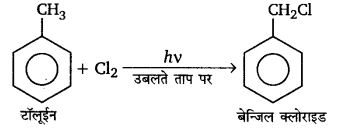
(ii) टॉलूईन की नाभिकीय प्रतिस्थापन अभिक्रिया

प्रश्न 20.
ऐरोमैटिक हाइड्रोकार्बनों से होने वाली कैन्सरजनीयता तथा विषाक्तता पर टिप्पणी लिखिए।
उत्तर
बेन्जीन एवं अनेक बहुचक्री ऐरोमैटिक हाइड्रोकार्बन बहुत आविषालु (toxic) और कैन्सरजनी (carcinogenic) रासायनिक यौगिक हैं। कैन्सरजनी पदार्थ जैव ऊतकों में कैन्सर उत्पन्न कर सकते हैं। सिगरेट के धुएँ, कोल और पेट्रोलियम के अपूर्ण दहन के उत्पादों में चिमनियों के धुएँ एवं चिमनियों में एकत्रित काजल (soot) में कैन्सरजनी बहुचक्री ऐरामैटिक हाइड्रोकार्बन उपस्थित होते हैं।
1,2-बेन्जऐन्ग्रेसीन (IV), 9, 10-डाइमेथिल-1,2-बेन्जऐन्ट्रेसीन (V) और 1,2-बेन्जपाइरीन (VI), कैन्सरजनी पदार्थ हैं। कैन्सरजनी पदार्थ मानव-शरीर में प्रवेश करके विभिन्न रासायनिक अभिक्रियाएँ करते हैं और कोशिकाओं (cells) के DNA को क्षति पहुँचाकर कैन्सर पैदा करते हैं। DNA के म्यूटेशन के परिणामस्वरूप कैन्सर होता है।
कुछ कार्बनिक पदार्थ वास्तव में स्वयं कैन्सरजनी नहीं होते, किन्तु जीव में उपाचयी क्रियाओं द्वारा सक्रिय कैन्सरजनों (carcinogens) में परिवर्तित हो जाते हैं। इस प्रकार के यौगिक प्रोकार्सीनोजन (procarcinogens) कहलाते हैं।
1,2-बेन्जपाइरीन (VI) एक कैन्सरजनी (carcinogens) है। यह लीवर में उपस्थित एन्जाइम द्वारा एपॉक्सी डायॉल (epoxy diol) में परिवर्तित हो जाता है जो म्यूटेशन प्रेरित करता है जिसके परिणास्वरूप कुछ कोशिकाओं की अनियन्त्रित वृद्धि हो सकती है।
बेन्जीन एक कैन्सरजुनी यौगिक है। लीवर में उपस्थित एन्जाइम द्वारा बेन्जीन का बेन्जीन ऑक्साइड में ऑक्सीकरण होता है। बेन्जीन ऑक्साइड़ और उससे व्युत्पन्न यौगिक कैन्सरजनी हैं और DNA से क्रिया करके म्यूटेशन प्रेरित कर सकते हैं।
विस्तृत उत्तरीय प्रश्न
प्रश्न 1.
ऐल्केनों की हैलोजनीकरण अभिक्रिया को मुक्त मूलक क्रियाविधि सहित समझाइए।
उत्तर
हैलोजनीकरण-ऐल्केनें सूर्य के प्रकाश या उत्प्रेरक की उपस्थिति में या उच्च ताप पर हैलोजनों के साथ प्रतिस्थापन अभिक्रियाएँ करती हैं। किसी हाइड्रोकार्बन के हाइड्रोजन परमाणुओं का हैलोजन परमाणुओं द्वारा विस्थापन हैलोजनीकरण कहलाता है। किसी ऐल्केन के प्रति हैलोजनों की अभिक्रियाशीलता का क्रम E, > Cl, > Br, > I, है। ऐल्केनों की हैलोजनीकरण अभिक्रियाएँ साधारणतः क्लोरीन और ब्रोमीन के साथ करायी जाती हैं, क्योंकि ऐल्केनों की फ्लुओरीन से सीधी अभिक्रिया अति प्रचण्ड व विस्फोटक होती है तथा ऐल्केनों की आयोडीन से अभिक्रिया उत्क्रमणीय एवं अति मन्द होती है।
1. क्लोरीनीकरण-हाइड्रोकार्बन के हाइड्रोजन परमाणुओं का क्लोरीन परमाणुओं द्वारा विस्थापन क्लोरीनीकरण कहलाता है।
उदाहरणार्थ-मेथेन और क्लोरीन के मिश्रण को सूर्य के विसरित प्रकाश में रखने पर या उच्च ताप (250-400°C) पर गर्म करने पर मेथेन के चारों हाइड्रोजन परमाणु एक-एक करके क्लोरीन परमाणुओं द्वारा विस्थापित हो जाते हैं। अभिक्रिया के उत्पादों के रूप में क्लोरोमेथेनों और हाइड्रोजन क्लोराइड का मिश्रण प्राप्त होता है।

क्लोरोफॉर्म क्लोरीन कार्बन टेट्राक्लोराइड क्लोरीनीकरण की क्रिया बहुत तीव्र गति से होती है। प्राप्त मिश्रण में मेथिल क्लोराइड (CH3Cl2), मेथिलीन क्लोराइड (CH2Cl2), क्लोरोफॉर्म (CHCl3) और कार्बन टेट्राक्लोराइड (CCl4) चारों क्लोरोमेथेन उपस्थित होती हैं। मेथेन और क्लोरीन के आयतनों के अनुपात को नियन्त्रित करके अभिक्रिया ऐच्छिक पद तक करायी जा सकती है। मेथेन की बहुत अधिकता होने पर मेथिल क्लोराइड मुख्य उत्पाद के रूप में प्राप्त होता है।

अभिक्रिया की क्रिया-विधि–सूर्य के विसरित प्रकाश में मेथेन की क्लोरीन से प्रतिस्थापन अभिक्रिया एक मुक्त मूलक श्रृंखला अभिक्रिया है। मुक्त मूलक श्रृंखला अभिक्रिया कई पदों में होती है। इसके प्रारम्भन (initiation), संचालन (propagation) और अन्तिम (termination) पद होते हैं। सूर्य के प्रकाश में मेथेन के क्लोरीनीकरण की क्रिया-विधि निम्नलिखित हैं-

अभिक्रिया के प्रारम्भन पद (1) में Cl2 अणु का क्लोरीन परमाणुओं (मुक्त मूलकों) में होमोलिटिक विदलन होता है। इस पद के लिए आवश्यक ऊर्जा प्रकाश से प्राप्त होती है। अत्यधिक अभिक्रियाशील क्लोरीन परमाणु शीघ्र मेथेन से अभिक्रिया करता है और उसमें से एक हाइड्रोजन परमाणु को हटा देता। है जिससे ![]() “(मेथिल मुक्त मूलक) और HCl अणु बन जाता है (पद 2)। मैथिल मुक्त मूलक अत्यधिक अभिक्रियाशील होता है और यह शीघ्र क्लोरीन अणु से अभिक्रिया करके मेथिल क्लोराइड (CH3Cl) और क्लोरीन परमाणु
“(मेथिल मुक्त मूलक) और HCl अणु बन जाता है (पद 2)। मैथिल मुक्त मूलक अत्यधिक अभिक्रियाशील होता है और यह शीघ्र क्लोरीन अणु से अभिक्रिया करके मेथिल क्लोराइड (CH3Cl) और क्लोरीन परमाणु ![]() बनाता है (पद 3)। क्लोरीन परमाणु पुनः मेथेन अणु से अभिक्रिया करके मेथिल मूलक बनाता है और मेथिल मूलक पुनः क्लोरीन अणु से अभिक्रिया करके क्लोरीन परमाणु बनाता है। पद (2), (3), (2), (3) का यह क्रम लगातार चलता रहता है। पद (2) और (3) श्रृंखला संचालन पद (chain propagating steps) कहलाते हैं। संचालन पद में एक मूलक लुप्त होता है और दूसरा मूलक उत्पन्न होता है। अभिक्रिया में क्लोरीन मूलक श्रृंखला वाहक (chain carrier) का कार्य करता है। अभिक्रिया श्रृंखला का अन्त दो क्लोरीन परमाणुओं के संयोजन से Cl2 अणु बनने (पद 4), या मेथिल मूलक और क्लोरीन मूलक के संयोजन से CH3Cl बनने (पद 5) से होता है। पद (4), (5) श्रृंखला के अन्तिम पद (chain terminating step) कहलाते हैं। सूर्य के सीधे प्रकाश में मेथेन और क्लोरीन का 1 : 2 मिश्रण विस्फोट के साथ अति तीव्र अभिक्रिया करता है। अभिक्रिया में कार्बन और हाइड्रोजन क्लोराइड बनते हैं-
बनाता है (पद 3)। क्लोरीन परमाणु पुनः मेथेन अणु से अभिक्रिया करके मेथिल मूलक बनाता है और मेथिल मूलक पुनः क्लोरीन अणु से अभिक्रिया करके क्लोरीन परमाणु बनाता है। पद (2), (3), (2), (3) का यह क्रम लगातार चलता रहता है। पद (2) और (3) श्रृंखला संचालन पद (chain propagating steps) कहलाते हैं। संचालन पद में एक मूलक लुप्त होता है और दूसरा मूलक उत्पन्न होता है। अभिक्रिया में क्लोरीन मूलक श्रृंखला वाहक (chain carrier) का कार्य करता है। अभिक्रिया श्रृंखला का अन्त दो क्लोरीन परमाणुओं के संयोजन से Cl2 अणु बनने (पद 4), या मेथिल मूलक और क्लोरीन मूलक के संयोजन से CH3Cl बनने (पद 5) से होता है। पद (4), (5) श्रृंखला के अन्तिम पद (chain terminating step) कहलाते हैं। सूर्य के सीधे प्रकाश में मेथेन और क्लोरीन का 1 : 2 मिश्रण विस्फोट के साथ अति तीव्र अभिक्रिया करता है। अभिक्रिया में कार्बन और हाइड्रोजन क्लोराइड बनते हैं-

एथेन और क्लोरीन के मिश्रण को सूर्य के विसरित प्रकाश में रखने पर मेथेन के सदृश एथेन के सभी हाइड्रोजन परमाणु एक-एक करके क्लोरीन परमाणुओं द्वारा विस्थापित हो जाते हैं। अभिक्रिया उत्पादों के रूप में क्लोरोएथेनों और हाईड्रोजन क्लोराइड का जटिल मिश्रण प्राप्त होता है। प्रोपेन व अन्य उच्च ऐल्केनों का क्लोरीनीकरण करने पर समावयवी मोनोक्लोरोऐल्केनों का मिश्रण प्राप्त होता है।
उदाहरणार्थ-प्रोपेन का क्लोरीनीकरण करने पर n-प्रोपिल क्लोराइड (CH3CH2CH2Cl) और आइसोप्रोपिल क्लोराइड (CH3 CHClCH3 ) का मिश्रण बनता है। n-ब्यूटेन । का क्लोरीनीकरण करने पर n-ब्यूविंल क्लोराइड (CH3 CH2CH2CH2Cl) और s-ब्यूटिल क्लोराइड (CH3CH2 CHClCH3) का मिश्रण बनता है। क्लोरीन की अधिकता होने पर विभिन्न क्लोरोऐल्केनों का जटिल मिश्रण प्राप्त होता है।
2. ब्रोमीनीकरण हाइड्रोकार्बन के हाइड्रोजन परमाणुओं का ब्रोमीन परमाणुओं द्वारा विस्थापन ब्रोमीनीकरण कहलाता है। ऐल्केनों की क्लोरीन की भाँति ब्रोमीन के साथ प्रतिस्थापन अभिक्रियाएँ होती हैं, परन्तु ब्रोमीनीकरण अपेक्षाकृत मन्द गति से होता है।

3. आयोडिनीकरण हाइड्रोकार्बन के हाइड्रोजन परमाणुओं का आयोडीन परमाणुओं द्वारा विस्थापन आयोडिनीकरण कहलाता है। ऐल्केनों की आयोडीन से प्रतिस्थापन अभिक्रिया बहुत मन्द और उत्क्रमणीय होती है, अतः उनको सीधा आयोडिनीकरण नहीं कराया जा सकता है। ऐल्केनों का आयोडिनीकरण प्राय: किसी ऑक्सीकारक (जैसे, HIO3 HNO3, आदि) की उपस्थिति में कराया जाता है। ऑक्सीकारक अभिक्रिया में बने HI को I2 में ऑक्सीकृत कर देता है, जिससे विपरीत अभिक्रिया नहीं होती है।
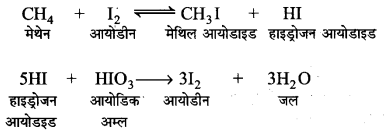
प्रश्न 2.
ऐल्कीनों के विरचन की प्रमुख विधियों का वर्णन कीजिए।
या
निर्जलीकरण अभिक्रियाएँ क्या हैं?
उत्तर
ऐल्कीनों के विरचने की प्रमुख विधियों का वर्णन निम्नवत् है-
1. ऐल्काइनों के आंशिक अपचयन से-ऐल्काइनों की हाइड्रोजन से योग अभिक्रिया का अन्तिम उत्पाद ऐल्केन हैं। इस अभिक्रिया में Ni को उत्प्रेरक के रूप में प्रयुक्त करते हैं तथा ताप 250-300°C रखा जाता है। यदि ऐल्काइन को अधिक मात्रा में लिया जाए तथा अभिक्रिया कम ताप पर सम्पन्न करायी जाए तो अभिक्रिया के फलस्वरूप ऐल्कीन भी प्राप्त होती हैं।
उदाहरणार्थ-

2. ऐल्कोहॉलों के निर्जलीकरण से-ऐल्कोहॉलों को सान्द्र सल्फ्यूरिक अम्ल अथवा सान्द्र फॉस्फोरिक अम्ल के साथ गर्म करने पर ऐल्कीन प्राप्त होती है।
उदाहरणार्थ-

इस अभिक्रिया में ऐल्कोहॉल के एक अणु में से जल की एक अणु निकल जाता है। इस प्रकार की अभिक्रियाओं को निर्जलीकरण (dehydration) कहते हैं।
3. ऐल्किल हैलाइडों के विहाइड्रोहैलोजनीकरण से-ऐल्किल हैलाइडों को कास्टिक पोटाश के ऐल्कोहॉलीय विलयन के साथ गर्म करने पर ऐल्कीन प्राप्त होती है। इस क्रिया में ऐल्किल हैलाइड के एक अणु में से हाइड्रोजन हैलाइड का एक अणु निकल जाता है। अतः इस क्रिया ‘ को विहाइड्रोहैलोजनीकरण (dehydrohalogenation) कहते हैं।
उदाहरणार्थ-

4. डाइहैलोऐल्केनों के विहैलोजनीकरण से-जिन डाइहैलाइडों में दो हैलोजन परमाणु दो समीपवर्ती कार्बन परमाणुओं पर स्थित होते हैं उन्हें विसिनल डाइहैलाइड (vicinal dihalides) अथवा 1, 2-डाइहैलोऐल्कॅन (1, 2- dihaloalkanes) कहते हैं। इस प्रकार के डाइहैलाइडों को मेथेनॉल अथवा एथेनॉल में जिंक चूर्ण के साथ गर्म करने पर ऐल्कीन प्राप्त होती है।
उदाहरणार्थ-

5. डाइकार्बोक्सिलिक अम्लों के वैद्युत-अपघटन से कोल्बे अभिक्रिया-डाइकार्बोक्सिलिक अम्लों के सोडियम या पोटैशियम लवणों के जलीय विलयन के वैद्युत-अपघटन से ऐनोड पर ऐल्कीन प्राप्त होती है।
उदाहरणार्थ-पोटैशियम सक्सिनेट के जलीय विलयन का वैद्युत-अपघटन करने पर ऐनोड पर एथिलीन प्राप्त होती है।

यह अभिक्रिया कोल्बे वैद्युत-अपघटनी अभिक्रिया (Kolbe’s electrolytic reaction) कहलाती है और निम्न पदों में होती है-

6. ग्रिगनार्ड अभिकर्मक से-हैलोजन प्रतिस्थापित ऐल्कीन (halogen substituted alkenes) तथा ग्रिगनार्ड अभिकर्मकों की अभिक्रिया से उच्च ऐल्कीन प्राप्त की जा सकती हैं।
उदाहरणार्थ-

7.अमोनियम हाइड्रॉक्साइड के टेट्रा-ऐल्किल व्युत्पन्नों से-अमोनियम हाइड्रॉक्साइड के टेट्रा-ऐल्किल व्युत्पन्नों को गर्म करने पर ऐल्कीन प्राप्त होती हैं।
उदाहरणार्थ-

8. ऐल्केनों के भंजन से-ऐल्केनों को वायु की अनुपस्थिति में 773-973 K ताप पर गर्म करने |से उनके अधिक अणुभार वाले अणु कम अणु भार वाले अणुओं में विभाजित हो जाते हैं। प्राप्त मिश्रण में निम्न ऐल्केन, ऐल्कीन तथा हाइड्रोजन होते हैं।
उदाहरणार्थ-

प्राप्त मिश्रण के अवयवों को उपयुक्त विधियों द्वारा अलग-अलग किया जा सकता है।
प्रश्न 3.
ऐल्कीनों के प्रमुख रासायनिक गुणों का विस्तृत वर्णन कीजिए।
उत्तर
द्विआबन्ध की उपस्थिति के कारण ऐल्कीन अत्यन्त क्रियाशील होती हैं तथा प्रायः ऐसी अभिक्रियाएँ प्रदर्शित करती हैं जिनमें द्विआबन्ध का T-आबन्ध विखण्डित हो जाता है। इनकी प्रमुख अभिक्रियाएँ इस प्रकार हैं-
1. योगात्मक अभिक्रियाएँ-ऐल्कीनों में द्विआबन्ध की उपस्थिति के कारण ये यौगिक योगात्मक अभिक्रियाएँ प्रदर्शित करते हैं। इन अभिक्रियाओं में द्विआबन्ध का π-आबन्ध तथा अभिकर्मक दो भागों में विभक्त हो जाता है।
अभिकर्मक का एक भाग द्विआबन्ध बनाने वाले एक कार्बन परमाणु से तथा दूसरा भाग दूसरे परमाणु से जुड़ जाता है।

ऐल्कीनों की योगात्मक अभिक्रियाओं के कुछ प्रमुख उदाहरण निम्नलिखित हैं-
(i) हाइड्रोजन का योग–ऐल्कीन निकिल चूर्ण की उपस्थिति में 523-573 K ताप पर हाइड्रोजन से योग करके ऐल्केन बना देती हैं।
उदाहरणार्थ-

निकिल की उपस्थिति में ऐल्कीनों तथा हाइड्रोजन की योग अभिक्रिया को सेवातिये तथा सेण्डर्न की अभिक्रिया कहते हैं। यह अभिक्रिया उच्च ताप पर होती है। पैलेडियम या प्लेटिनम उत्प्रेरक की उपस्थिति में ऐल्कीन तथा हाइड्रोजन साधारण ताप पर ही अभिक्रिया कर लेती हैं तथा ऐल्केन बनाती हैं।
(ii) हैलोजनों का योग-ऐल्कीन, हैलोजनों के साथ संयोग करके डाइहैलोजन यौगिक बनाती हैं। इस अभिक्रिया में हैलोजनों की क्रियाशीलता का क्रम Cl2 > Br2 >I2 है। यह अभिक्रिया किसी अध्रुवीय विलायक जैसे CCl4 तथा सूर्य के प्रकाश की उपस्थिति में या किसी ध्रुवीय विलायक जैसे जल में की जाती है।
उदाहरणार्थ-

(iii) हाइड्रोजन हैलाइडों का योग-किसी भी ऐल्कीन का एक अणु किसी भी हाइड्रोजन हैलाइड के एक अणु से संयोग करके योगात्मक यौगिक बनाता है।
उदाहरणार्थ-
![]()
इस अभिक्रिया में हैलोजन हैलाइडों की क्रियाशीलता का क्रम HI > HBr > HCI है।
(iv) जल का योग–अम्लीय उत्प्रेरकों की उपस्थिति में ऐल्कीनों तथा जल की योग अभिक्रिया के फलस्वरूप ऐल्कोहॉल प्राप्त होते हैं। जल का योग मारकोनीकॉफ के नियम के अनुसार होता है।
उदाहरणार्थ-

(v) ओजोन का योग–ऐल्कीनों के ईथरीय विलयन में ओजोन प्रवाहित करने पर योगात्मक यौगिक बनते हैं जिन्हें ओजोनाइड (ozonides) कहते हैं। ओजोनाइडों को जल के साथ उबालने पर ये अपघटित हो जाते हैं। जल-अपघटन की क्रिया Zn चूर्ण की उपस्थिति में करायी जाती है। यह जल-अपघटन से प्राप्त हाइड्रोजन परॉक्साइंड को अपघटित कर देता है ताकि यह अन्य उत्पादों से अभिक्रिया न कर सके। ऐल्कीनों तथा ओजोन की योग अभिक्रिया तथा ओजोनाइडों के जल-अपघटन की अभिक्रिया, इस सम्पूर्ण क्रिया को ओजोनी अपघटन (ozonolysis) कहते हैं।
उदाहरणार्थ-
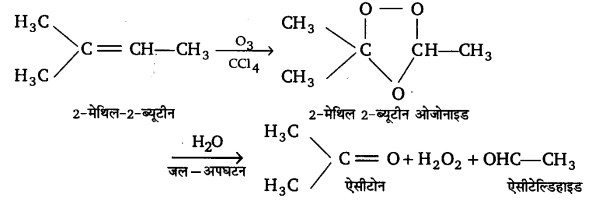
स्पष्ट है कि सम्पूर्ण अभिक्रिया में द्विआबन्ध टूट जाता है तथा जिन कार्बन परमाणुओं से द्विआबन्ध जुड़ा था, वे ऑक्सीजन परमाणु से जुड़ जाते हैं।
2. प्रतिस्थापन अभिक्रियाएँ-असंतृप्त होने के कारण ऐल्कीन मुख्यतः योगात्मक अभिक्रियाएँ प्रदर्शित करती हैं तथा प्रतिस्थापन अभिक्रियाएँ प्रदर्शित नहीं करती हैं लेकिन उच्च ताप पर हैलोजनों के साथ संयोग करके ये प्रतिस्थापन उत्पाद भी देती हैं।
उदाहरणार्थ-

3. ऑक्सीकरण
(i) दहन-हवा अथवा ऑक्सीजन में ऐल्कीन दीप्तिमान ज्वाला के साथ जलती हैं तथा कार्बन डाइऑक्साइड और जल बनते हैं।
![]()
(ii) क्षारीय पोटैशियम परमैंगनेट विलयन से—1% क्षारीय KMnO4 विलयन से ऑक्सीकृत होकर ऐल्कीन, डाइहाइड्रॉक्सी यौगिक बनाती हैं।

इस अभिक्रिया में KMnO4 का गुलाबी रंग लुप्त हो जाता है तथा K2MnO4 बनने के कारण हरा रंग प्राप्त होता है। इस अभिक्रिया की सहायता से दिये गए कार्बनिक यौगिक में कार्बन-कार्बन द्विआबन्ध या त्रिआबन्ध की उपस्थिति की अर्थात् असंतृप्तता की जाँच की जा सकती है। 1% क्षारीय KMnO4 को बॉयर अभिकर्मक (Baeyer’s reagent) तथा असंतृप्तता के इस परीक्षण को बॉयर परीक्षण (Baeyer’s test) कहते हैं।
(iii) अम्लीय पोटैशियम परमैंगनेट विलयन से-अम्लीय पोटैशियम परमैंगनेट विलयन के प्रभाव में ऐल्कीन अणु उस स्थान से विखण्डित हो जाता है जहाँ द्विआबन्ध होता है तथा अम्ल, ऐल्डिहाइड या कीटोन प्राप्त होते हैं।
उदाहरणार्थ-

उपरोक्त अभिक्रियाओं सेप्राप्त फॉर्मिक अम्ल अभिक्रिया की परिस्थितियों में कार्बन डाइऑक्साइड व जल में ऑक्सीकृत हो जाता है।
HCOOH +[O] → CO2 + H2O
उपर्युक्त के अतिरिक्त ऐल्कीने बहुलकीकरण, समावयवीकरण, ऑक्सीमरक्यूरेशन डीमरक्यूरेशन तथा हाइड्रोबोरोनेशन या हाइड्रोबोरेशन अभिक्रियाएँ भी प्रदर्शित करती हैं।
प्रश्न 4.
ऐल्काइनों के विरचन की विभिन्न विधियों का वर्णन कीजिए।
या
ऐसीटिलीन के विरचन की प्रमुख विधियों का वर्णन कीजिए।
उत्तर
ऐल्काइनों के विरचन की विभिन्न विधियों का वर्णन निम्नवत् है-
1. डाइहैलोऐल्केन से—KOH के उबलते हुए ऐल्कोहॉलीय विलयन में डाइहैलोऐल्केन मिला देने से ऐल्काइन प्राप्त होती है।
उदाहरणार्थ-

2. हैलोफॉर्म से—क्लोरोफॉर्म (CHCl3) अथवा आयोडोफॉर्म (CHI3) को सिल्वर चूर्ण के साथ गर्म करने पर ऐसीटिलीन गैस प्राप्त हो जाती है।

3. संश्लेषण विधिहाइड्रोजन गैस के वातावरण में दो कार्बन इलेक्ट्रोडों के मध्य विद्युतीय आर्क (electric arc) उत्पन्न करने पर ताप लगभग 3270K हो जाता है तथा कार्बन व हाइड्रोजन के संयोग से ऐसीटिलीन गैस बनती है।
![]()
4. मैलिक अथवा फ्यूमेरिक अम्ल के सोडियम अथवा पोटैशियम लवण के वैद्युत अपघटन से (कोल्बे की विधि)-मैलिक अथवा फ्यूमेरिक अम्ल के सोडियम अथवा पोटैशियम लवण के जलीय विलयन का वैद्युत-अपघटन करने पर ऐनोड पर ऐसीटिलीन गैस प्राप्त हो जाती है।
उदाहरणार्थ-
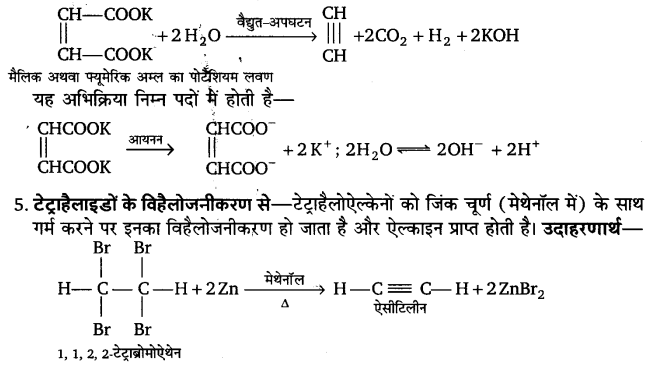
5. टेट्रालाइडों के विहैलोजनीकरण से टेट्राहैलोऐल्केनों को जिंक चूर्ण (मेथेनॉल में) के साथ गर्म करने पर इनका विहैलोजनीकरण हो जाता है और ऐल्काइन प्राप्त होती है।
उदाहरणार्थ-

6. कैल्सियम कार्बाइड से (प्रयोगशाला विधि)-कैल्सियम कार्बाइड को जल में मिलाने पर ये । दोनों पदार्थ साधारण ताप पर ही एक-दूसरे से अभिक्रिया करके ऐसीटिलीन बनाते हैं।
![]()
इस अभिक्रिया का उपयोग ऐसीटिलीन को प्रयोगशाला में बनाने में किया जाता है। प्रयोगशाला विधि–एक शंक्वाकार फ्लास्क (conical flask) में रेत के ऊपर कैल्सियम कार्बाइड के टुकड़े रख दिए जाते हैं। फ्लास्क में दो छेद वाला कॉर्क लगा होता है जिसमें बिन्दु कीप (dropping funnel) तथा निकास नली लगा दी जाती हैं। निकास नली को एक धावन बोतल से जोड़ देते हैं जिसमें कॉपर सल्फेट का अम्लीय विलयन भरा रहता है। धावन बोतल को गैस जार से जोड़ देते हैं। बिन्दु कीप से बूंद-बूंद करके फ्लास्क में रखे कैल्सियम कार्बाइड पर जल गिराया जाता है। अभिक्रिया के फलस्वरूप ऐसीटिलीन गैस तीव्रता से निकलती है। इसे । गैस में अशुद्धियों के रूप में फॉस्फीन, हाइड्रोजन सल्फाइड, आर्सीन और अमोनिया गैसें मिली। होती हैं जो अम्लीय कॉपर सल्फेट विलयन द्वारा अवशोषित कर ली जाती हैं। शुद्ध ऐसीटिलीन गैस को पानी के ऊपर गैस जार में एकत्रित कर लिया जाता है।

7. ऐसीटिलीन से उच्च ऐल्काइनों का संश्लेषण-पहले ऐसीटिलीन की सोडियम धातु से 475K पर अथवा द्रव अमोनिया में सोडामाइड (sodamide) से 196K पर अभिक्रिया कराते हैं। जिससे सोडियम ऐसीटिलाइड बनता है। यह ऐल्किल हैलाइडों से अभिक्रिया करके उच्च ऐल्काइन देता है।
उदाहरणार्थ-

प्रश्न 5.
ऐल्काइनों की प्रमुख योगात्मक अभिक्रियाओं का वर्णन कीजिए।
या
ऐल्काइनों की अम्लीय प्रकृति को समझाइए।
उत्तर
ऐल्काइनों की प्रमुख योगात्मक अभिक्रियाएँ निम्नवत् हैं-
1. इलेक्ट्रॉनस्नेही योगात्मक अभिक्रियाएँ—ये अभिक्रियाएँ निम्न दो पदों में होती हैं-

कुछ प्रमुख इलेक्ट्रॉनस्नेही योगात्मक अभिक्रियाएँ निम्न हैं-
(i) हैलोजनों का योग-क्लोरीन और ब्रोमीन ऐल्काइनों से योग करके पहले 1, 2-डाइहैलोऐल्कीन और बाद में 1, 1, 2, 2-टेट्राहैलोऐल्केन बनाती हैं।
उदाहरणार्थ

इस अभिक्रिया में Br2 का लाल भूरा रंग लुप्त हो जाता है इसलिए इस अभिक्रिया का उपयोग असंतृप्तता के परीक्षण के लिए किया जाता है।
(ii) हैलोजन हैलाइडों का योग-हैलोजन हैलाइड ऐल्काइनों से योग करके पहले वाइनिल हैलाइड और फिर ऐल्किलीडीन हैलाइड (alkylidene halide) बनाते हैं। ये योग मारकोनीकॉफ के नियम के अनुसार होते हैं।
उदाहरणार्थ-

(iii) हाइपोक्लोरस अम्ल का योग–ऐल्काइन हाइपोक्लोरस अम्ल से दो पदों में योग करती।

(iv) जल का योग–ऐल्काइन 333K पर मयूंरिक सल्फेट तथा तनु सल्फ्यूरिक अम्ल की उपस्थिति में जल के एक अणु के साथ संयुक्त होकर कार्बोनिल यौगिक देती हैं।


(v) हाइड्रोजन सायनाइड का योग-ऐसीटिलीन Ba(CN)2 अथवा HCl में CuCl की उपस्थिति में हाइड्रोजन सायनाइड से योग करके वाइनिल सायनाइड (vinyl cyanide) बनाती है।

2. नाभिकस्नेही योगात्मक अभिक्रियाएँ-ऐसीटिलीन को पोटैशियम मेथॉक्साइड (दाब पर) की सूक्ष्म मात्रा (1-2%) की उपस्थिति में 433-473K पर मेथेनॉल में से गुजारने पर मेथिल वाइनिल ईथर प्राप्त होता है।

3. ऐल्काइनों की अम्लीय प्रकृति-ऐल्काइनों के त्रिआबंध से जुड़े हाइड्रोजन परमाणु अम्लीय होते हैं। यह तथ्य निम्न अभिक्रियाओं द्वारा सत्यापित होता है-
(i) सोडामाइड से अभिक्रिया-सोडामाइड एक प्रबल क्षारक है। एथाइन और अन्य टर्मिनल ऐल्काइन अथवा 1-ऐल्काइन द्रव अमोनिया में सोडामाइड से अभिक्रिया करके
सोडियम ऐसीटिलाइड (क्षारीय) बनाती हैं।


(ii) सोडियम से अभिक्रिया-एथाइन तथा अन्य टर्मिनल ऐल्काइनों को सोडियम (प्रबल क्षारक) के साथ गर्म करने पर सोडियम ऐसीटिलाइड बनते हैं।

(iii) अमोनियामय सिल्वर नाइट्रेट विलयन से अभिक्रिया-ऐल्काइनों के त्रिआबंध पर जुड़े हाइड्रोजन परमाणु भारी धातु आयनों जैसे Ag’ आयनों द्वारा भी प्रतिस्थापित हो जाते हैं। ऐल्काइन् अमोनियामय सिल्वर नाइट्रेट विलयन से अभिक्रिया करके सिल्वर ऐसीटिलाइड बनाती हैं।

(iv) अमोनियामय क्यूप्रस क्लोराइड विलयन से अभिक्रिया-एथाइन तथा टर्मिनल ऐल्काइन अमोनियामय क्यूप्रस क्लोराइड विलयन से अभिक्रिया करके कॉपर ऐसीटिलाइड के लाल अवक्षेप बनाती हैं।

प्रश्न 6.
बेंजीन की प्रमुख प्रतिस्थापन अभिक्रियाओं का क्रियाविधि सहित वर्णन कीजिए।
उत्तर
बेंजीन की प्रमुख प्रतिस्थापन अभिक्रियाएँ निम्नवत् हैं-
1. हैलोजनीकरण-बेंजीन सूर्य के प्रकाश की अनुपस्थिति में तथा हैलोजन वाहक जैसे Fe या FeCl, की उपस्थिति में कमरे के ताप पर ही क्लोरीन या ब्रोमीन से अभिक्रिया करके प्रतिस्थापन उत्पाद बनाती है।
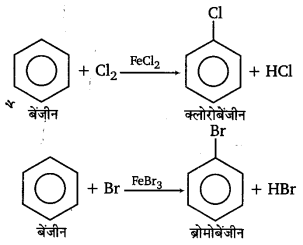
क्रियाविधि—बेंजीनं पर हैलोजनीकरण निम्न प्रकार से सम्पन्न होता है-

2. सल्फोनीकरण-बेंजीन को सान्द्र सल्फ्यूरिक अम्ल के साथ गर्म करने पर बेंजीनसल्फोनिक अम्ल प्राप्त होता है। सधूम सल्फ्यूरिक अम्ल के साथ यह अभिक्रिया साधारण ताप पर ही हो जाती है।

क्रियाविधि-बेंजीन का सल्फोनीकरण निम्न प्रकार से सम्पन्न होता है-
-
- सांद्र H2SO4 एक SO3 अणु को निष्कासित करता है।
H2SO4 + H2SO4 ⇌ H3O++ HSO–4 + SO3
SO3 निम्न अनुनाद संरचनाओं को एक अनुनाद संकर है। - इलेक्ट्रॉनस्नेही बेंजीन रिंग पर आक्रमण कर एक σ -जटिल का निर्माण करता है।

- σ-संकर क्षारक HSO–4 से क्रिया कर प्रतिस्थापन उत्पाद बनाता है।
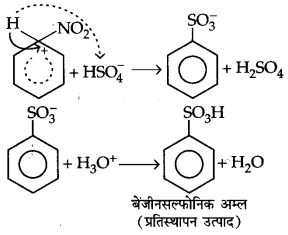
- सांद्र H2SO4 एक SO3 अणु को निष्कासित करता है।
3. नाइट्रीकरण-बेंजीन सान्द्र सल्फ्यूरिक अम्ल की उपस्थिति में सान्द्र नाइट्रिक अम्ल से क्रिया करके नाइट्रोबेंजीन बनाती है।

साधारण ताप पर यह अभिक्रिया धीमी गति से तथा ताप बढ़ाने पर तेजी से होती है। अधिक ताप पर तथा नाइट्रिक अम्ल की अधिक मात्रा प्रयुक्त करने पर डाइ-तथा ट्राइ-प्रतिस्थापन उत्पाद अर्थात् m-डाइनाइट्रोबेंजीन तथा 1, 3, 5-ट्राइनाइट्रोबेंजीन प्राप्त होते हैं।
क्रियाविधि-बेंजीन का नाइट्रीकरण निम्न प्रकार से सम्पन्न होता है

4. फ्रीडल-क्राफ्ट ऐल्किलीकरण—किसी लूईस अम्ल जैसे AlCl3 की उपस्थिति में बेंजीन की अभिक्रिया किसी ऐल्किल हैलाइड से कराने पर बेंजीन का ऐल्किलीकरण हो जाता है।
उदाहरणार्थ-

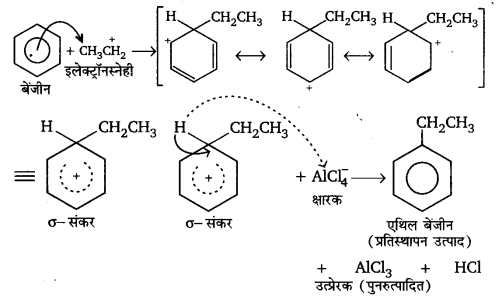
5. फ्रीडल-क्राफ्ट ऐसिलीकरण-किसी लूईस अम्ल जैसे AlCl3 की उपस्थिति में बेंजीन की अभिक्रिया किसी ऐसिल हैलाइड से कराने पर बेंजीन का ऐसिलीकरण हो जाता है।
उदाहरणार्थ-

क्रियाविधि-बेंजीन का फ्रीडल-क्राफ्ट ऐसिलीकरण निम्न प्रकार से सम्पन्न होता है।

We hope the UP Board Solutions for Class 11 Chemistry Chapter 13 Hydrocarbons (हाइड्रोकार्बन) help you. If you have any query regarding UP Board Solutions for Class 11 Chemistry Chapter 13 Hydrocarbons (हाइड्रोकार्बन), drop a comment below and we will get back to you at the earliest.









 प्रश्न 9.
प्रश्न 9.
 (स)
(स)